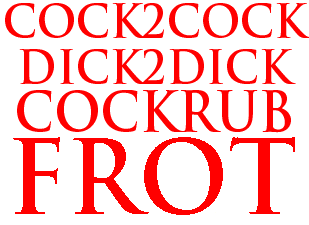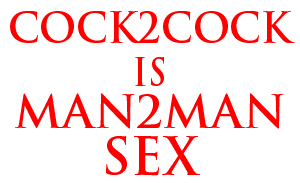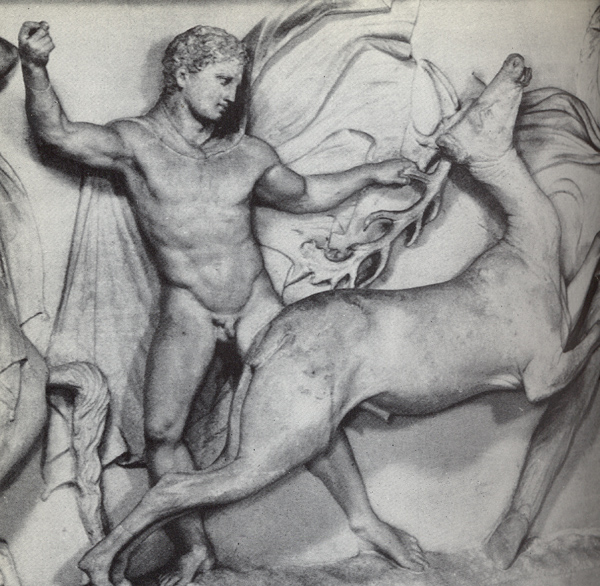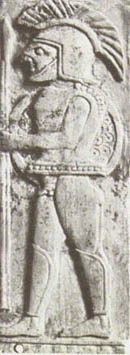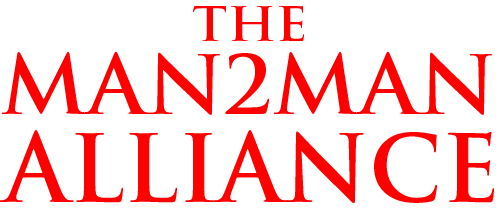






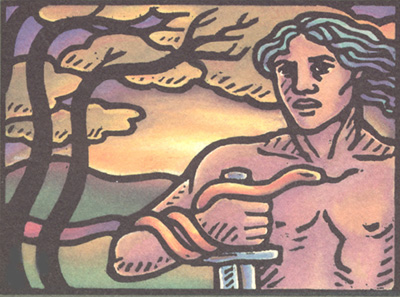


reclaiming our nobility as men
2-27-09
Intro note from Bill Weintraub:
Hi guys
These are four emails from a new Warrior named Chris who lives in Alabama;
and my replies are included.
This is a long post, and as I sometimes do to make a post easier to read, I've divided it into two parts:
consists of Chris's emails and my replies.
presents further thoughts, inspired by Chris's letters, on male-male Love -- Eros -- as it was, and as it can be again.
I hope you'll start with Part I.
Chris's emails are excellent.
And he's a true Warrior.


CHRIS'S FIRST EMAIL:
You have liberated me. I never understood myself but as I read I felt my emotions filling me. Parts of me that had turned to stone and were incongruent started to fit like a puzzle. I shared this information with my love and he read it and said that is exactly who we are.
I have always been a warrior at heart but felt as if I never fit in. I hated anal sex so when a partner would want me to I'd lose my erection. So I settled for being the "bottom" and used poppers in order to accommodate my pain and unease. I have lived my life confused because I am masculine and aggressively protective, as I have noticed a lot of masculine "gay" men to be. I was talking to my love and we were discussing your site and realized that Western Society loves to label every fucking thing including our behavior. They have built a pervasive lie around their ignorantly created labels and sold us a masquerade.
Since I found your site and have been reading it, I realized that I'm neither gay, bi or str8. I'm Chris, a man, who loves another man, Joe.
Yesterday we made love and I was free to not try to culminate my sex act with him by penetrating him. We were face to face and heart to heart. I actually made love to him with my mind and he made love to me with his mind and the paradigm broke for both of us. We knew from the beginning of the love making that there would be no anal. The experience was spiritual. He is my soul. We both feel, as Joe put it, empowered now. Thank you for taking the time to start this movement and begin the path to reclaiming our nobility as a special class of men. We are protectors, builders, providers, fighters, and lovers.
Ur warrior,
Chris
Bill's reply to Chris's first email:
Hi Chris
Thank you for this very beautiful letter.
It raised my spirits -- which at this moment, is important.
Let's take a look.
Good!
That's the purpose of our work.
Right.
"turned to stone" is a good metaphor.
And I've been there, as have most of us.
It's what happens when you're forced to deny your true and Manly feelings.
And made to be something alien to your nature -- as a Man.
Yes -- that too is well put.
Good!
Great!
Right.
Because the Warrior archetype is constantly and unrelentingly denigrated.
Right.
Chris, that speaks well of you.
The analists will tell you that if you don't like anal there's
something wrong with you.
We tell you that if you don't like anal -- indeed, if you hate it --
there's something very much right with you.
And that something is not just physical -- it's moral.
Chris -- "Eros" is the ancient Greek god of and word for Love between Men.
Plato's Symposium is the greatest discussion of Eros -- among the Greeks or anyone else.
Here are some lines from a classicist named Werner Jaeger -- he's on
the Heroes Reading List -- about Plato and the Symposium.
Just one explanatory note.
Jaeger uses the ancient Greek word "kalokagathia."
That's a word which combines "kalos" = beautiful + noble; and
"agathos" = good + brave
So -- to the Greeks, beautiful was also noble, and good was also brave.
And, as you'll see, when they say beautiful in terms of male-male
love, they mean it in a moral sense.
Here's Jaeger:
Even in the first speeches about Eros, Plato brought out the fact that Eros implies a yearning towards moral beauty : the speakers mentioned the lover's ambition and his anxiety that the beloved should be perfect and attain excellence. That gave Eros his place in the moral
structure of society. ...
~Jaeger, Paideia Vol II, p 194.
So: Eros is about "a yearning towards moral beauty."
That yearning to attain moral beauty aka excellence is what gives
"Eros his place in the moral structure of society."
That yearning is not compatible with -- indeed, has nothing to do with -- anal penetration.
The Greeks understood that.
Plato understood it.
To the Greeks, there can be nothing beautiful, and certainly nothing moral, in a "sex" act which centers on the anus.
In no small part because to the Greeks, the word "kakos" -- which means "evil, ugly, cowardly" -- derives from "kakke" -- the word for human waste, for shit.
One's life -- and one's love -- can either be "kalos" -- noble and beautiful -- or "kakos" -- ugly and evil.
There's no way around that.
I discuss that plain fact at more length in my reply to Warrior Joe's You people are changing lives;
and also in my reply to Warrior Steve's to rub and grind and make face to face love.
And Chris, you may also want to look at
Chris -- the pansexualiasts seek to divorce sexuality from morality.
You can't do that.
Because if you do - what you get is analism -- among other really
destructive social forces.
I've said that anal penetration is a social evil; and that analism is the enemy of humanity.
And I mean it.
Did Plato understand that?
Yes.
That too speaks well of you.
Right.
My phrase is "using poppers to push past the pain."
True for thousands upon thousands upon thousands of Men.
Right.
"masculine" is good
"aggressive" is good
"protective" is good
and "aggressively protective" is good
"Masculine and aggressively protective" applies both to my late lover, Brett, and to my present partner, Patrick, who's "bisexual," was a street fighter and kickboxer and is a karate black belt.
He's masculine, aggressive and protective.
I am too.
Right.
So, as you understand, they need to lose the "gay" part -- and simply accept that they're Men.
Right.
What's crucial to understand is that at one time, and not terribly
long ago, this behavior wasn't labeled.
So -- the key concept is that affection, intimacy, and Love between
Men is an activity -- not a condition.
Chris, that's exactly right.
Great!
Right.
Love between Men must be spiritual.
And so must the sex which expresses that Love.
I don't know how else to put that.
But that's what the Greeks understood.
And that's why they talk about the yearning for moral beauty.
And why "Plato holds that between the moral and the physical cosmos
there is perfect harmony."
The word areté -- excellence -- is derived from Ares -- the god of war -- the Warrior God.
Areté is a moral quality.
Realized in the physical world.
Phallus Against Phallus
Manhood Against Manhood
Man Against Man
is morally harmonious because it honors the physical, phallic reality of male sexuality.
It's harmonious because it honors and exalts Masculinity and both the physical hallmark of Masculinity -- Phallus -- and the spiritual hallmark of Masculinity -- Fighting Spirit.
And it's no accident that both Phallus and Fighting Spirit are summed up for Men by the word Manhood.
Because they're the same thing.
Phallus is Manhood
Manhood is Man
So -- as human beings we live in the physical cosmos.
But we also have to respect and honor the moral cosmos.
When we don't, our lives devolve.
Good!
Again, that's my intent.
Chris, you're welcome.
Right.
Like I said, "kalokagathia" is a combination of "kalos" -- which means "beautiful/noble"; and "agathos" -- which means "good/brave"
So kalokagathia means "nobility and goodness"
That's what Men are meant to be: Noble and Good.
Beautiful and Brave.
Which is why we speak of Brave Beauty.
Beauty isn't beautiful unless it's Brave.
This is another concept from the Greeks:
There are qualities or "goods" which human beings desire -- like
physical beauty.
And then there are "divine virtues" -- like Courage.
If you divorce the merely human "goods" -- like beauty -- from the
divine virtues -- like courage --
what you get is nothing.
You lose both beauty and courage.
But beauty which is a reflection and expression of courage -- is never lost.
Because it partakes of the Divine, the Godly, the Eternal.
Yes, that's absolutely right.
Chris
Thank you Chris.
A terrific letter.
You're a true Warrior.
Bill
CHRIS'S SECOND EMAIL:
Bill,
I really like how you break down what I write. I no longer feel lost. Maybe we can have an outdoor adventure for a group of guys. I imagine that men would come with the idea of sex on their minds as we have all been programed to do. They'd probably be like deer in head lights....this is a conceptual thing before it is a physical thing....I mean to me (and I will always pay deferrence to you) men have to be "debugged" so to speak. It requires much introspection which is only possible if there is a willingness that precedes everything. I remember the slogan from the gay movement, "Visibility equals evolution" It worked for the gay movement. Our willingness to fight and be strong is what will win them over. I'm going to join a fighting class here. I don't want to do Karate. Any suggestions? I was in the Special Ops in the Air Force but they only teach you to kill fast that isn't what I want. I want contact and sweat but I want to be good at it....now that makes my cock hard....I have made myself so maladjusted to "fit" into society now it can fuck itself because I fuckin piss standing up.
Ur warrior,
Chris
Bill's reply to Chris's second email:
Hey Chris
It's great hearing from you!
Chris, let me explain what's going on with me personally.
I live with Patrick, whom I met through the site.
Patrick is now very ill.
Taking care of him takes up a huge amount of my time.
Our core membership knows that -- and knows it's going on.
And now so do you.
So -- I wanted to answer you earlier, but I had a lot of other things on my plate.
Which happens every day.
And which means that sometimes I can't respond to people as quickly as I'd like.
Chris, as you know, I lost my first lover Brett to AIDS in 1995.
And that loss is what prompted all of this -- Heroic Homosex and The
Man2Man Alliance.
Because after Brett died -- which of course was a very brutal
experience for me -- I had to figure out how it was that a guy who
wasn't into anal -- could die of an anally-vectored disease.
And I realized it was because he'd been forced and pressured into
doing anal by the culture -- gay culture -- in which he lived.
Once I understood that, I could look clearly at that culture -- and
see it for what it was.
But -- so far as I knew -- with Brett gone, I was now the only guy on
earth who was into frot and who disliked anal, promiscuity and effeminacy.
And here's the thing -- Brett too was into frot and disliked anal,
promiscuity and effeminacy.
But we never talked about it.
It was just the way we were.
Anyways, I wrote about it in a piece titled Hyacinthine Love.
And White Crane Journal, which is where the piece appeared, posted it
on their website.
That was in late 1999, early 2000.
And I started hearing from guys.
Lots of guys.
And basically what they said was -- "You've told my story."
So then I realized there were a lot of us.
And I put together first Cockrub Warriors and then Heroic Homosex.
And then Man2Man Alliance.
I met Patrick through the sites in 2002.
Brett was gay-identified.
When he first found the sites, Patrick was straight-identified; but he
then started identifying as "bi."
Okay -- that's enough history for now.
Let's get back to you:
I really like how you break down what I write.
Thank you Chris.
I no longer feel lost.
Good!
You're not lost.
You're among friends now.
But we need to figure out how to move this off the net.
At least for some of us.
Right.
That's one very big problem.
Men find and come to the site because they think it's a sexual site.
Which it is in that it's about a sex act.
But actually the site is about, for lack of a better word, values.
How should we live?
And what's become clear over the years of doing this work, is that
Fidelity is a core value among our guys.
As it was among the ancient Greeks.
And there's a reason for that.
There are paths that human beings can follow.
Fidelity is one path.
Promiscuity is another.
And they don't mix -- because they can't.
So either we're about Fidelity or we're not.
You can't be about both.
The analists have phrases -- "committed but play together"; "open relationship"
But what happens inevitably in "recreational sex" is that, eventually,
one of the partners becomes emotionally involved with one of his
playmates.
And that does severe damage to both partners -- and to the relationship.
The relationship may survive.
But it's never the same as it was before the emotional betrayal.
The Greeks understood that.
And they very clearly and purposefully set the bar higher for
male-male relationships.
This is a quote from John Boswell, who's also on the Reading List.
Boswell was the openly gay chair of the history department at Yale
until his death from AIDS in 1995.
His book is titled Same-Sex Unions in Premodern Europe.
And Chapter 3 of the book is an on-the-whole excellent summary of the
ancient world.
Here are some excerpts:
Plutarch adduces with evident disapproval cases of husbands who
allowed their wives to be unfaithful to gain some advantage, and then
notes, "By contrast, of all the many [same-sex] lovers there were and
have been, do you know of a single one who surrendered his beloved,
even to gain favor from Zeus? I do not." (Erotikos 760B).
The proponent of same-sex passion in the Hellenistic Affairs of the
Heart says that wisdom and experience teach that love between
males is the most stable of loves. This prejudice [sic] was doubtless
influenced by the Symposium of Plato, in which heterosexual
relationships and feelings are characterized as "vulgar," and their
same-sex equivalents as "heavenly."
This contrast exercised wide influence on subsequent discussions of love.
~ Boswell, 74.
Here's more Boswell:
Doubtless the most surprising and counter-intuitive aspect of same-sex
eroticism was not its frequency or duration, but its long and hallowed
relationship to democracy and military valor, which modern military
officials tend to find improbable or even unbelievable.
Boswell goes on to note that in Plato's Symposium, the character named
Phaedrus argued that no one's behavior is better than that of those
[same-sex] couples who are in love, because they would rather behave
badly in sight of father or comrade than in view of those they love.
He even advanced the idea that:
if we could somehow contrive to have a city or an army composed of
lovers and those they loved, they could not be better citizens of
their country than by thus refraining from all that is base in a
mutual rivalry for honor; and such men as these, when fighting side by
side, one might almost consider able to make a little band victorious
over all the world. For a man in love would surely choose to have all
the rest of the host rather than the one he loves see him forsaking
his station, or flinging away his arms; sooner than this, he would
prefer to die many deaths: while, as for leaving the one he loves in
the lurch, or not succoring him in peril, no man is such a craven that
the influence of Love [Eros] cannot inspire him with a courage that
makes him equal to the bravest born; and without doubt what Homer
calls a "fury inspired" by a god in certain heroes is the effect
produced on lovers by Love's peculiar power. Moreover, only such as
are in love will consent to die for others.
~ Symposium 179
That's all the Boswell -- and Chris, I repost this material from Boswell frequently because it's really important.
I most recently posted it in the Manhood section of The Strife of Valour.
And I hope you'll take a look at it in the context of that post as well.
The point here is that the ancients expected Men to be more faithful
in same-sex relationships -- than in hetero relationships.
And the Men were more faithful.
Now, here's something interesting.
"My foreign friend," who lives in a "third-world" country, has said
that in his experience Men who have a *strong* masculine identity are
more likely to be monogamous with other Men -- and relatively
promiscuous with women.
That's how Patrick is -- actually.
So I suspect it's a common male pattern -- at least among strongly
masculine men.
Analism violates that pattern by telling Men to be promiscuous.
We cannot and will not do that.
The point to our work is in encouraging Men to be Men.
And if by nature Men are monogamous with other Men -- we have to
encourage them to be Faithful.
Chris:
They'd probably be like deer in head lights....this is a conceptual thing before it is a physical thing....I mean to me (and I will always pay deferrence to you) men have to be "debugged" so to speak.
Yes -- that's right.
De-programmed.
Their minds are now full of misinformation.
That has to be corrected.
It requires much introspection which is only possible if there is a willingness that precedes everything.
Yes.
I remember the slogan from the gay movement, "Visibility equals evolution" It worked for the gay movement. Our willingness to fight and be strong is what will win them over.
Right.
But Chris, I want you to understand that so far, our guys are NOT
willing to be visible.
Why is that?
Well, the former Soviet dissident Natan Sharansky argues that the
level of dissent is dictated by the price of dissent.
The higher the cost or price of dissent -- the lower the level of dissent.
What happens to our guys is that the moment they say a word critical
of "anal sex" or "sexual orientation" -- they get squashed.
The gay-identified guys in particular are mobbed, beaten up, and
dragged through the mud.
I've been attacked over and over and over again on the web -- the
level of attack is unreal.
So -- this is not easy.
Now -- remember -- I was active in the gay movement in the early days
-- from 1972 on.
What people no longer remember is that it was very rough going.
Most guys would NOT come out.
They thought that people like me -- who were out -- were crazy.
That didn't begin to change until AIDS forced guys out.
But I can tell you that from 1972 all the way through the 1980s -- it
was very difficult -- and often nasty.
So: the culture will change.
The paradigm will shift.
But it'll take time.
The race will be to the strong -- not the swift.
I'm going to join a fighting class here. I don't want to do Karate. Any suggestions?
Sure.
Mixed martial arts is now very popular.
There are Fight Schools all over the place.
There must be one in in your town.
And / or -- there's jiu jitsu and particularly Brazilian Jiu Jitsu --
very popular and very much used in mixed martial arts.
But -- in my opinion, Chris, the risk of injury in the Fight Schools
is higher than in traditional martial arts dojos.
I recommend that you really scope out the schools and make sure what
they're doing is sane.
Because -- traditional martial arts is hierarchic -- and that protects
the less skilled from being hurt by the more skilled or just more
brutal.
MMA has tended to dispense with the hierarchical elements of martial arts.
Which is fun.
But more dangerous.
Okay.
Sure it does.
Contact and sweat is MMA.
You know, the guy we call "NW" aka "naked wrestler," who wrote
aggression and the beauty of guys --
has trained in MMA.
He's a good friend.
If you write to him,
he may have some suggestions about MMA.
And Chris he has a lot of posts on the site -- "aggression and the
beauty of guys" is a fairly early post, but there's a list of his
posts at the end of that one.
Including The Warrior Male, which is about MMA.
You'd probably like it.
And here's another post from NW -- called our American forced Hetero-sexualized society.
All of NW's posts are excellent.
And he may have suggestions on how to scope out the schools.
Right!
Chris, society made you maladjusted.
It's our intent to change that.
To change society.
But Chris it's going to take time.
This has been and will be a long, brutal struggle.
Chris, there's a woman named Frances who's been active on the site
and in email with me.
She's said that we need to form a Warrior Community.
I think she's right.
I don't think that any of the men are ready for that.
But I could be wrong.
Chris
Thank you Chris.
You're a true Warrior.
Bill
CHRIS'S THIRD EMAIL
Bill,
I honor you. I will need your guidance in developing into my full masculinity because I am lost. It is like when I entered Alanon I knew absolutely SHIT I was full of misinformation and that experience taught me deferrence. I'm alone here except for Joe. I won't venture away from Joe and he doesn't know as much as I do. He is every bit as confused as I am plus he is married and limited by time. I need masculine companionship that isn't trying to exploit me but understands me. What I find is anyone I get close to that is M2M wants to just fuck and or they won't get close enough to be in my heart. What I envision is a group of men who are bound by loyalty and honor for each other. Frotting may be a part of it to develop the emotional bond, fighting will be a part of it to test the security of the group. I believe the reason I like to wrestle Joe is because I test his strength and his strength is my strength. I posses his strength and he mine. It would be a wonderful group to have manly men loyal and honorable to each other. Not beat down one another but all gain from each other. No actual competition as we conceptualize it today. There is competition but we all realize that the winner belongs to us. Is part of us and we belong to him....am I on track, Bill. This is instinctive for me. I have always tried to create a "tribe". I thought it was because I'm prior military but after reading your site it may just be instinctive for me.
Chris
I think one of the first things I should do is go get the hell beat out of me while learning some art of fighting. LOL.
Bill's response:
Hey Chris
Thank you Chris.
I understand.
You'll become less lost over time.
Yes -- I understand.
I understand.
Married is married -- it eats up time.
But we can work to end your confusion -- and Joe's.
I need masculine companionship that isn't trying to exploit me but understands me.
Right.
What I find is anyone I get close to that is M2M wants to just fuck and or they won't get close enough to be in my heart.
Yeah.
There's no other model for them.
All they've got is analism.
What you need is a Socratic circle.
That meets in a palaistra.
I mean it.
Right.
I like that.
Chris, if you're talking about all the guys frotting with each other
-- that won't work.
They'll just get their rocks off and leave.
Our society -- and men's lives in particular -- are anomic.
The tendency is to atomize -- to become atoms spinning in space.
We need to counter that.
Promiscuity won't do that.
I know where you're coming from with it -- but it won't work.
Yes -- the group has to learn to fight together.
I believe the reason I like to wrestle Joe is because I test his strength and his strength is my strength.
Yes -- and that's well-said.
I possess his strength and he mine.
Yes -- also well and beautifully said.
Yes it would be wonderful!
Okay.
The Greeks were very competitive -- the idea of excellence is to
strive to excel -- but they were very respectful of each other and
honorable towards each other.
Jaeger:
The philosophy of later times bade man obey an inner standard; it
taught him to regard honour as the external image of his internal
value, reflected in the criticism of his fellows.
...
Homer and the aristocracy of his time believed that the denial of
honour due was the greatest of human tragedies. The heroes treat each
other with constant respect, since their whole social system depends
on such respect. They have all an insatiable thirst for honour, a
thirst which is itself a moral quality of individual heroes. When the
Homeric man does a great deed, he never hesitates to claim the honour
which is its fit reward.
...
Christian sentiment will regard any claim to honour, any
self-advancement, as an expression of sinful vanity. The Greeks,
however, believed such ambition to be the aspiration of the individual
towards that ideal and supra-personal sphere in which alone he can
have real value. Thus it is true in some sense to say that the areté
of a hero is completed only in his death. Areté exists in mortal man.
Areté is mortal man. But it survives the mortal, and lives on
in his glory, in that very ideal of his areté which accompanied and
directed him throughout his life.
"The heroes treat each other with constant respect"
And this:
"honour [is] the external image of [the warrior's] internal value,
reflected in the [praise and] criticism of his fellows
So -- competition is okay.
And Chris -- when you look at Greek sculpture, what you're seeing is
the ideal of the Warrior's areté.
That's what makes Greek art so powerful.
It's a spiritual force.
It's not just that they're good-looking guys who are naked.
There are many works of art which have been created since the fall of the Greco-Roman world which feature naked guys, but which don't come anywhere close to the spiritual qualities, those Masculine and Manly spiritual qualities, which Greek art captures in every statue and painting.
That's because the Greeks believed that the Man embodies his areté -- his Virtue-Valour-Manhood.
Jaeger: "Areté exists in mortal man. Areté is mortal man. But it survives the mortal, and lives on in his glory, in that very ideal of his areté which accompanied and directed him throughout his life."
So when you look at these statues, what you're seeing the is the ideal of the Man's areté -- again, his Virtue, his Valour, his Manhood -- which "accompanied and directed him throughout his life," and lives on after his life.
Again, it's a spiritual force.
Yes -- and the loser too.
That's how the Spartans would have thought of it.
Chris -- as NW says -- someone has to lose a fight.
Sometimes you lose, sometimes you win.
The important thing is that you FIGHT.
That's what matters.
Yes, you're very much on track Chris.
Chris -- it's instinctive for Men.
Men evolved -- or were created if you prefer -- to be part of a
Warrior Band within a tribe.
We're all Warriors.
Chris, just the word "Warrior" is incredibly powerful for Men.
That's been one of the great revelations of doing this work.
I always knew that "Warrior" was powerful for me.
There's no other word in the language that has that power for me.
But once I started doing this work I found out how incredibly powerful
the word is for virtually all Men.
Warrior.
Men really respond to it.
For me, the key words are Warrior and Fighter.
But what I've seen is that Men want to be Warriors.
All Men.
They need that.
Robert Loring: We ARE Warriors.
Chris -- you show those Men a way to have sex with another Man which
honors and exalts their Male, Manly, Warrior Nature -- and they'll be
yours.
But -- to do that you'll have to cut through all the societal,
religious right, analist left, bullshit.
Not easy.
Chris
I think one of the first things I should do is go get the hell beat out of me while learning some art of fighting. LOL.
Okay.
I think Fighting -- Fight School -- is a good way to connect with other Men.
Chris -- that's all for now.
You're a true Warrior.
Bill
CHRIS'S FOURTH EMAIL:
Good morning Bill
Yes that is what I meant. They won't get close. Like with anything I do I have really focused on this subject and the feeling 'lost' is because the more I think about it the more I see the damage that has been done. I felt lost first because I didn't understand. Now that I'm understanding more I don't personally feel lost but I feel lost by the overwhelming effect of what I'm understanding on a society as a whole. Like the movie 'The Matrix' or in the religious teachings of Gnosticism that we are all asleep, is what I see. What Joe and I discussed yesterday was that we have no culture anymore. My opinion is that a culture is only a culture if it is expressed from the internal. This is what you and I are talking about. Our American 'culture' is from outside to internal, an indoctrination. It isn't a culture. Joe and I were talking about the fact that we have the Greek 'code' in us. He said that I'm warrior like because I will fight on every front if I believe there to be an injustice. I seek justice. My whole history is like that. I was an exchange student to Germany, then I joined the military, then I became and environmental scientist to fight for the environment, I came out boldly, my first partner Steve had Hiv and I fought that, I just joined the Vaccine trials for HIV in Birmingham which scared the shit out of everyone I know except Joe. I don't have HIV so I was able to receive the vaccine in order to see how my body reacts to it and compile information. My mother told me that I may as well go play with rattlesnakes. Now I'm about to finish law school in 7 months. I'm naturally a fighter and I fight for the greater good. Joe and I discussed that we are like Spartans even though we never were exposed to their culture we carry the 'code' of their culture. I thought this was interesting.
Brother Bill, If I seem to run on and not seem focused it is because I am overwhelmed at the moment just as you are. I'm in the middle of bar review so that I can pass the Bar here which is a very hard bar. I love what I'm learning from you.
I honor you,
Chris
Bill's response:
Hey Brother Chris
Great hearing back from you!
Lotsa good stuff here -- let's take a look:
Right.
Good!
Right -- an immense amount of damage has been done.
But you know, it's like the environment.
An immense amount of damage has been done there too.
And we'd all -- or mostly all -- like it to be different.
But we're stuck with it.
So -- in the post titled We ARE Warriors --
I talk about Parzival -- not a Greek for once, but a knight going in quest of the Grail -- and what the great mythographer Joseph Campbell
says about him, that he's:
[and] gifted with the paired virtues of courage and compassion, to
which was added loyalty.
"the forthright, simple, uncorrupted, noble son of nature, without
guile, strong in the purity of the yearning of his heart" -- that's a
crucial phrase for us as Warriors
And then Campbell says this:
That Parzival's life is fulfilled,
not by renouncing the world, but by participation with every ounce of
one's force in the century's order of life in the way dictated by
one's own uncorrupted heart: what mystics call the Inner Voice.
...For there's no fixed law, no established knowledge of God, set up
by prophet or priest, [and, I would add, no cultural tyranny, set up
by analists or racists or anyone else,] that can stand against the
revelation of a life lived with integrity in the spirit of its own
brave truth.
So, the key to fulfillment is "participation with every ounce of one's force in the century's order of life"
I call that "living the life of one's time."
You have to live the life of your time.
And you have to do it with all your soul and all your strength.
I would much rather have been born in Sparta ca 550 BC -- than in 20th
century America.
But -- I was born where and when I was born, and that dictated the
fights I would face.
So this is the Fight of our Time.
And that's just what it is.
A lot of damage has been done.
It's fallen to us to set it right.
And that's what we're doing.
And if we do it through the "revelation of a life lived with integrity
in the spirit of its own brave truth" -- we'll succeed.
It may take a while.
But we'll win.
Right.
Yes -- but again, this is just what's come our way as Men and as Warriors.
Yes.
Yes, that's correct -- or sort of correct.
We're all of us exiles in our own land for now -- for the present.
However, you have Warrior culture.
Warriordom.
Which spans the Millenia.
And which we will revive.
And the more you immerse yourself in that culture -- the less alone you'll feel.
Chris, I said I rarely see TV.
Because there's nothing there for me.
What I do instead is read.
And I read the Greeks.
I read Plutarch and Plato and Pausanias and Pindar and Xenophon.
And they open up their world for me.
They show me a world in which sexual orientation doesn't exist.
In which masculine and martial men routinely have lovers.
A world which centers -- literally -- on Fight Sport.
Nude, Male, Fight Sport.
A world of great religious-athletic festivals, in which nude Men fight
other nude Men -- watched and surrounded by other nude Men.
In beautiful temple complexes brimming over with statues of nude male
Gods and Heroes and Athletes.
Thousands upon Thousands of Heroic Male images.
Thousands upon Thousands.
A world governed not by religious lies, but by the Four Virtues:
Justice
Courage
Self-Control
Wisdom
And to wisdom, Plato adds piety.
It's easy for me to be pious in that world, because the gods aren't against me.
Ares, like me, is a fighter.
Apollo, like me, has a younger lover.
As do Poseidon and Zeus.
Their stories are my stories.
So -- there's an old Marxist saying: "Being determines consciousness."
If a person spends all his time, for example, on analist sites,
analism becomes his consciousness.
That's why I tell our guys -- if you want to see Men -- go to a Fight Site.
Because then Fighting becomes your consciousness.
The more you read the Greeks -- the more they become your consciousness.
Chris -- try to get the little book on the Reading List from Pelican
Classics titled Plutarch on Sparta or just On Sparta -- different
editions have different titles.
And then read the life of Lycurgus, Agis, Cleomenes.
Read.
You'll feel less alone.
You'll see.
And you'll begin to be able to imagine -- the future.
Yes.
Yes, that's well-said.
Right.
Sure you do.
Right -- remember what we said, via Jaeger, in Excellence, Honor, and
the Molding of Men:
That Aristotle says that the highest areté is revealed in acts of moral heroism.
Here's Jaeger:
So -- moral heroism is what matters.
Good!
Chris, I'm sorry to hear that Steve had HIV.
What happened to him?
Okay.
This is a conversation that goes beyond this letter.
Chris, what you did is brave -- no question of that.
And I know and honor the spirit in which you did it.
But in our view, there already exist vaccinces for HIV.
They're called "social vaccines," and they're very effective -- in
most cases 100% effective -- which is far better than a physical
vaccine can hope to be.
Brett died of HIV.
I had sex with him every day for at least 10 or 11 years.
I don't have HIV.
Because we didn't do anal.
So: HIV / AIDS is a disease of risk behaviors.
It's not like an airborne virus or a waterborne parasite or malaria.
You actually have to go out of your way to get HIV.
Either through sex or through injection drug use.
And in both cases -- you can still have sex and even use drugs -- and
not get HIV.
If you're a "man who has sex with men" -- MSM -- and you don't do anal
-- your chances of getting HIV are remote.
So -- you don't need a vaccine.
You just need to change your behavior.
You don't have to stop having sex.
You just have to change the sort of sex.
And the sex we recommend is a LOT better -- far more pleasurable, and
not degrading.
And it's HIV safe.
Chris, that's actually true of drug use too.
Most drugs can be smoked -- and there's no risk of HIV infection
through smoking.
Obviously we don't advocate drug use.
But the fact is, even there, there are HIV-safe ways to use.
In Africa, we now know that most HIV infection would cease through a
combo of Fidelity and male circumcision.
And I am concerned that you were in that trial because the last report
I saw said that the vaccine may have raised your risk:
So -- I know you did that because you have a big and brave heart.
But what we've been trying to get across to MSM is that they don't
need what are known in AIDS Inc. as "drugs and devices" -- condoms,
lube, gels, PEP, PREP, vaccines, HAART, etc.
They don't need any of that.
They just have to stop doing anal.
And then their lives will not only be free of HIV -- they'll be free
of effeminacy and degradation as well.
No one's sex life should center on an organ of fecal excretion.
No one's.
We say of anal that it's
shit sex
pain sex
disease sex
death sex
NO ONE -- male or female -- needs that.
NO ONE.
Chris, that's great!
Yes -- I think it's interesting too.
The more you learn about Sparta -- the more you'll feel that way.
You'll see -- I just posted The Strife of Valour: Austerity and Equality at Sparta, which I hope you and all our other Warriors will read;
and I'll be posting a lot more about Sparta and the Spartans -- and you'll see -- you do indeed "carry the 'code' of their culture."
We all do.
Chris, I understand.
I'm amazed that you've been able to write and read as much as you have.
I hope you pass and on the first go.
Thank you Chris.
I like talking with you.
You understand our work.
Thank you Chris.
I honor you -- you're a true Warrior.
Bill
Guys -- there's a lot in Chris's letters.
But for now I want to focus on questions of values and morality.
Which is why I brought up with Chris the issue of Eros and the yearning for moral beauty.
Moral Beauty aka
Moral Heroism aka
Self-sacrifice aka
Nobility and Goodness aka
Kalokagathia aka
Excellence aka
Areté.
And guys, if you haven't yet read Excellence, Honor, and the Molding of Men -- which discusses the concept of areté -- please read it.
For your sake.
There's information in there which YOU need and which will help YOU.
As there is in The Strife of Valour.
Now -- the first thing we need to be clear about is the difference between what we call "homosexuality" and what the ancients called Eros -- male-male Love.
Because these are two very different concepts -- and realities.
Eros is not "homosexuality."
Our modern construct "homosexuality" is about disease, genetic anomalies, and lust.
EROS is about Virtue, Men, and Love.
Once again: Our modern construct "homosexuality" and its evil twin "sexual orientation" are about disease, genetic anomalies, and lust.
EROS is about Virtue, Men, and Love.
That's an enormous difference.
So long as you conceive of your life in terms of "homosexuality" -- or, if you prefer, "sexual orientation -- being gay" -- you will be forever fucked -- both metaphorically and literally.
What's core here is what my foreign friend has said and which the Greeks exemplify:
Which means that it is as normal, natural, and under the right circumstances, common, for a Man to Love a Man -- as for a Man to love a Woman.
Each has its place.
Each has its purpose.
To the ancients, the purpose of love between a Man and a Woman was procreation.
While Love between a Man and a Man also had a purpose.
That purpose was moral.
It was the furthering of the attainment of excellence -- for both of the male partners.
Excellence.
Nobility and Goodness.
"Kalokagathia"
Remember what Jaeger said:
That's powerful stuff:
"the highest principle of all human will and action";
"the ultimate motive which works with its own inward necessity"; and at the same time
"the ground for all that happens in nature"
Really powerful -- really high-minded -- and it's what powers both Greek culture in general -- and Eros in particular -- the Love of Man for Man.
So : the Love of Man for Man does not take place in some a-moral or a-religious or a-spiritual universe.
It's not like that.
To the contrary, the Love of Man for Man is both an expression and a furthering of kalokagathia, nobility and goodness, which is, ultimately, "the ground for all that happens in nature."
And "which works with its own inward necessity."
And that's not all.
The moral cosmos of Eros -- of male-male Love -- is that of the striving for excellence -- of one Man striving with another to excel.
Jaeger:
It is very significant that the first time we have an opportunity of studying the Dorian [the Spartans were Dorian] aristocracy closely we should find that homosexual love is the ruling motive in their character.
...
It is, after all, easy to understand how a passionate admiration of noble bodies and balanced souls could spring up in a race which for countless years had prized physical prowess and spiritual harmony as the highest good attainable by man, and which had striven by grave and ceaseless rivalry, by exertion involving the utmost energies of mind and body alike, to bring those qualities to the greatest possible perfection. Men who loved the possessors of those enviable qualities were moved by an ideal, the love for areté. Lovers who were bound by the male Eros were guarded by a deeper sense of honour from committing any base action, and were driven by a nobler impulse in attempting any honourable deed.
The Spartan state deliberately made Eros a factor, and an important factor, in its agogé.
So -- Jaeger says that these are Men who are Striving "by grave and ceaseless rivalry, by exertion involving the utmost energies of mind and body alike, to bring those qualities [of physical prowess and spiritual harmony] to the greatest possible perfection."
Men -- Striving -- by grave and ceaseless rivalry -- by exertion involving the utmost energies of mind and body alike --
to bring the qualities of physical prowess and spiritual harmony --
to the greatest possible perfection.
That's a Strife of Valour.
Which is why that phrase, when it appears in Xenophon, who is, after all, simply reporting a Spartan reality, a part of the Agogé which he himself has seen in action -- it's why that phrase is so important.
Male-Male Love -- Eros -- is a Strife of Valour.

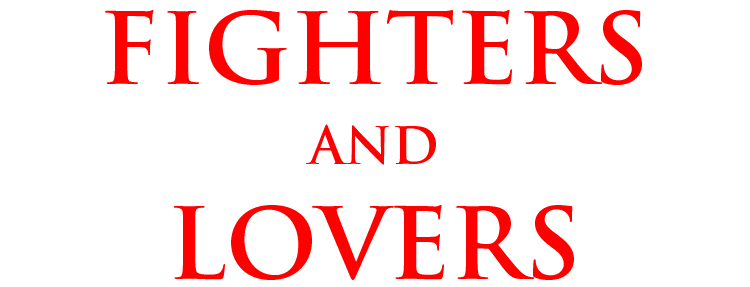
You have liberated me.
I never understood myself but as I read I felt my emotions filling me. Parts of me that had turned to stone
and were incongruent
started to fit like a puzzle.
I shared this information with my love and he read it and said that is exactly who we are.
I have always been a warrior at heart but felt as if I never fit in.
I hated anal sex
Beauty and good are only two closely allied aspects of one and the
same reality -- two aspects which were fused into one by general Greek
idiom, since the highest human areté [excellence] was called
'beauty-and-goodness', kalokagathia. This 'beauty' or 'good', this
kalokagathia in its pure state is, we understand, the highest
principle of all human will and action, the ultimate motive which
works with its own inward necessity, and at the same time the ground
for all that happens in nature. For Plato holds that between the moral
and the physical cosmos there is perfect harmony.
so when a partner would want me to I'd lose my erection.
So I settled for being the "bottom" and used poppers in order to accommodate my pain and unease.
I have lived my life confused because I am masculine and aggressively protective,
as I have noticed a lot of masculine "gay" men to be.
I was talking to my love and we were discussing your site and realized that Western Society loves to label every fucking thing including our behavior. They have built a pervasive lie around their ignorantly created labels and sold us a masquerade.
Since I found your site and have been reading it, I realized that I'm
neither gay, bi or str8. I'm Chris, a man, who loves another man, Joe.
Yesterday we made love and I was free to not try to culminate my sex act with him by penetrating him. We were face to face and heart to heart. I actually made love to him with my mind and he made love to me with his mind and the paradigm broke for both of us.
We knew from the beginning of the love making that there would be no anal. The experience was spiritual.


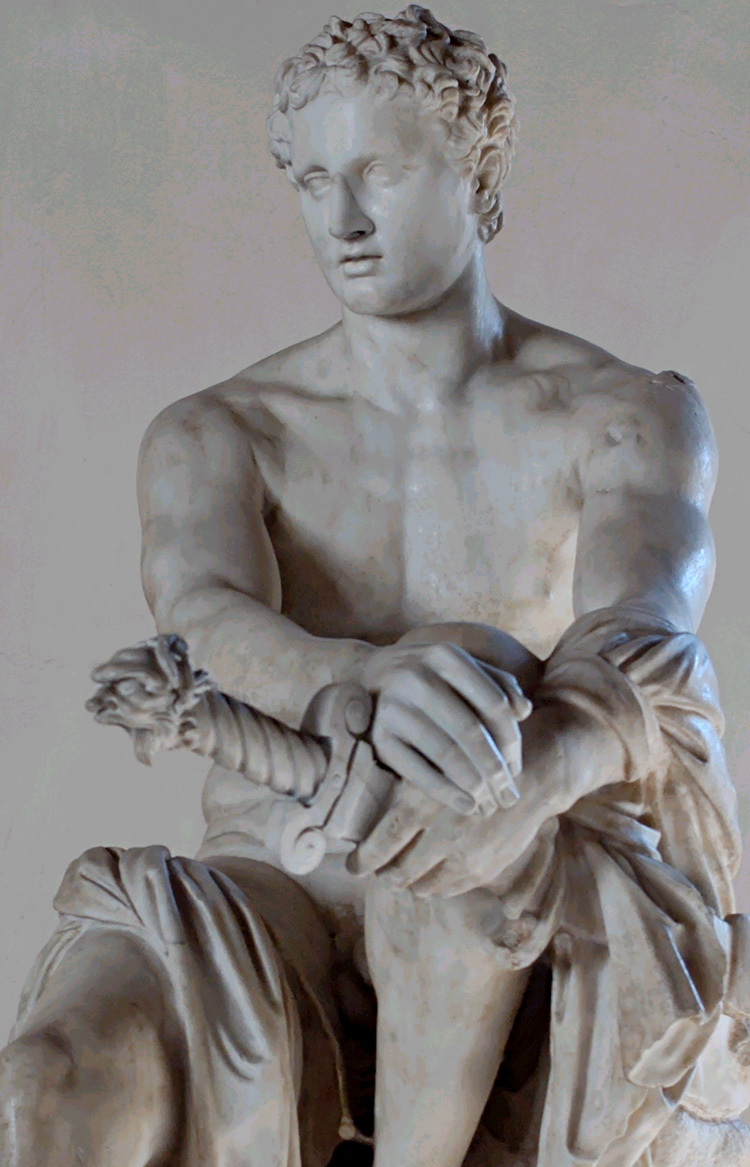
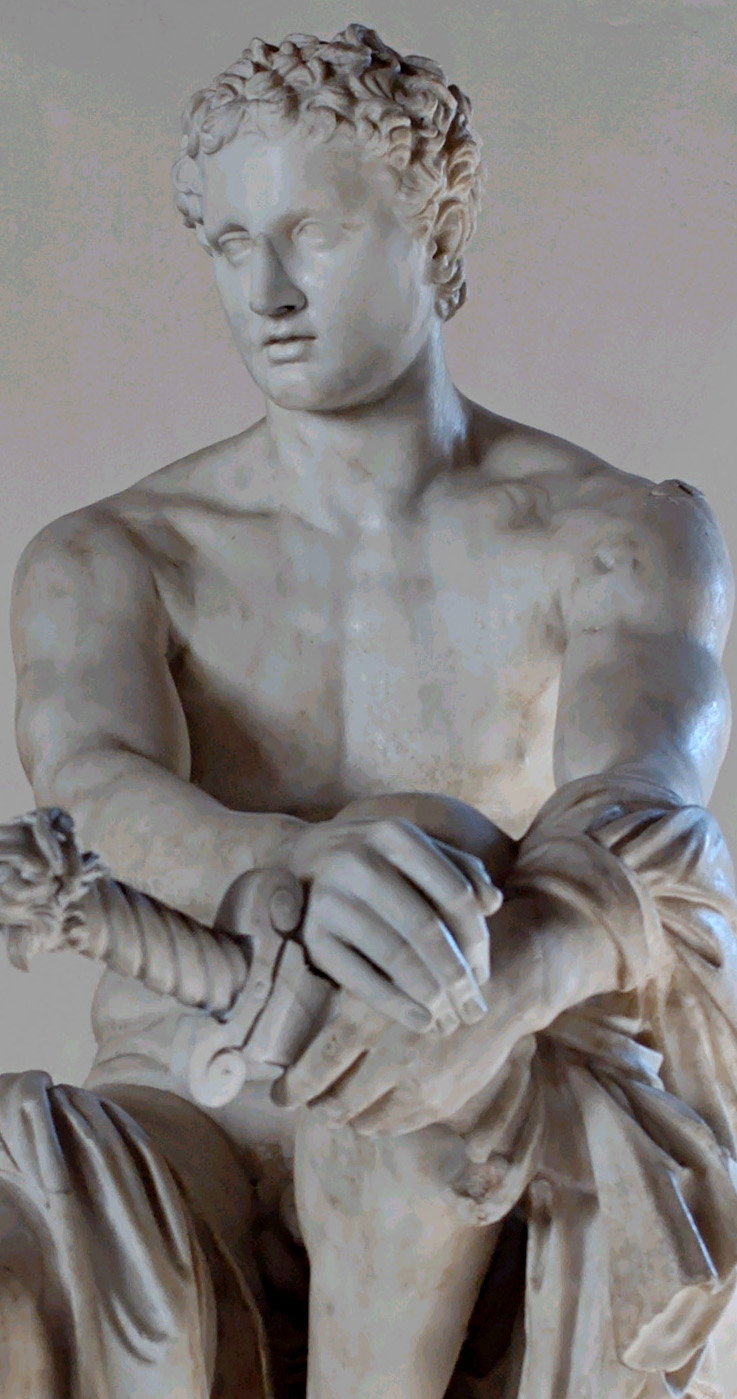
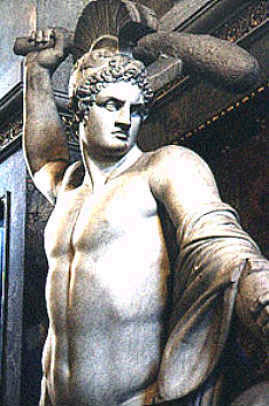

He is my soul. We both feel, as Joe put it, empowered now.
Thank you for taking the time to start this movement
and begin the path to reclaiming our nobility as a special class of men.
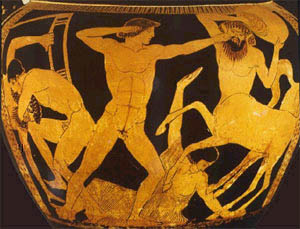
We are protectors, builders, providers, fighters, and lovers.
Ur warrior,
Maybe we can have an outdoor adventure for a group of guys. I imagine that men would come with the idea of sex on their minds as we have all been programed to do.
Most ancient writers -- in striking opposition to their modern
counterparts -- generally entertained higher expectations of the
fidelity and permanence of homosexual passions than of heterosexual
feelings.
I was in the Special Ops in the Air Force but they only teach you to kill fast
that isn't what I want. I want contact and sweat but I want to be good at
it....now that makes my cock hard....
I have made myself so maladjusted to "fit" into society now it can fuck itself because I fuckin piss standing up.
Ur warrior,
I honor you.
I will need your guidance in developing into my full masculinity because I am lost.
It is like when I entered Alanon I knew absolutely SHIT I was full of misinformation and that experience taught me deferrence.
I'm alone here except for Joe. I won't venture away from Joe and he doesn't know as much as I do. He is every bit as confused as I am plus he is married and limited by time.
What I envision is a group of men who are bound by loyalty and honor for each other.
Frotting may be a part of it to develop the emotional bond,
fighting will be a part of it to test the security of the group.
It would be a wonderful group to have manly men loyal and honorable to each other.
Not beat down one another but all gain from each other. No actual competition as we conceptualize it today.
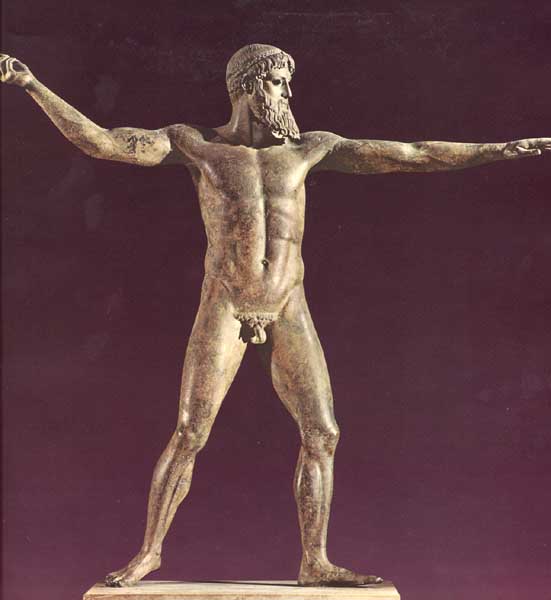
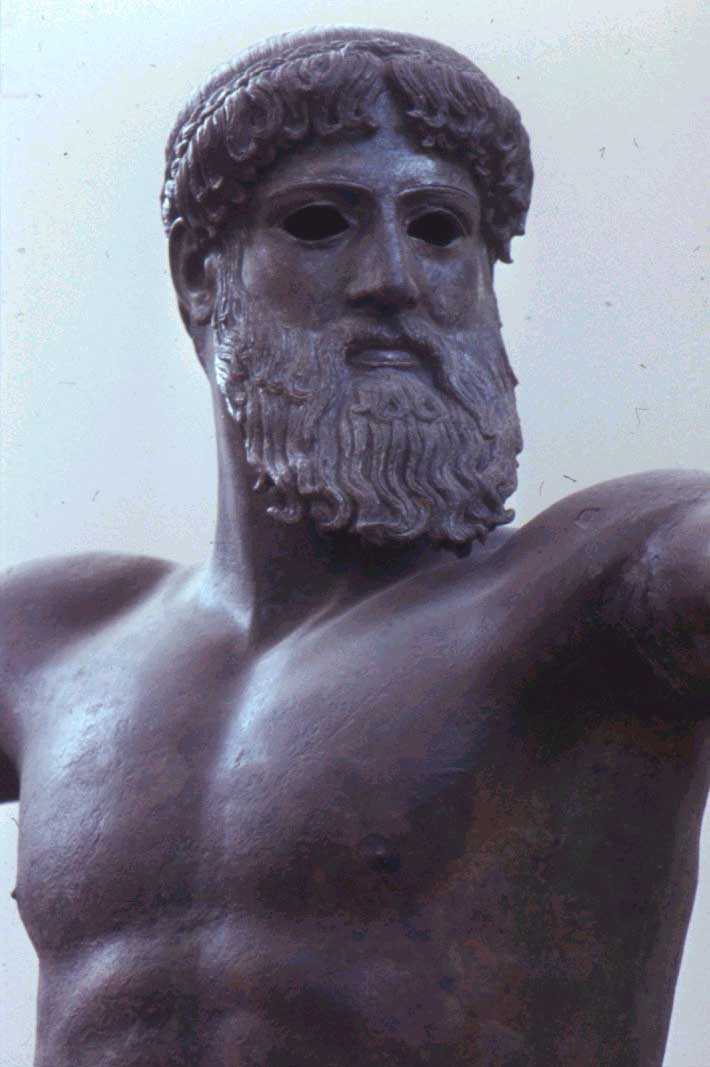
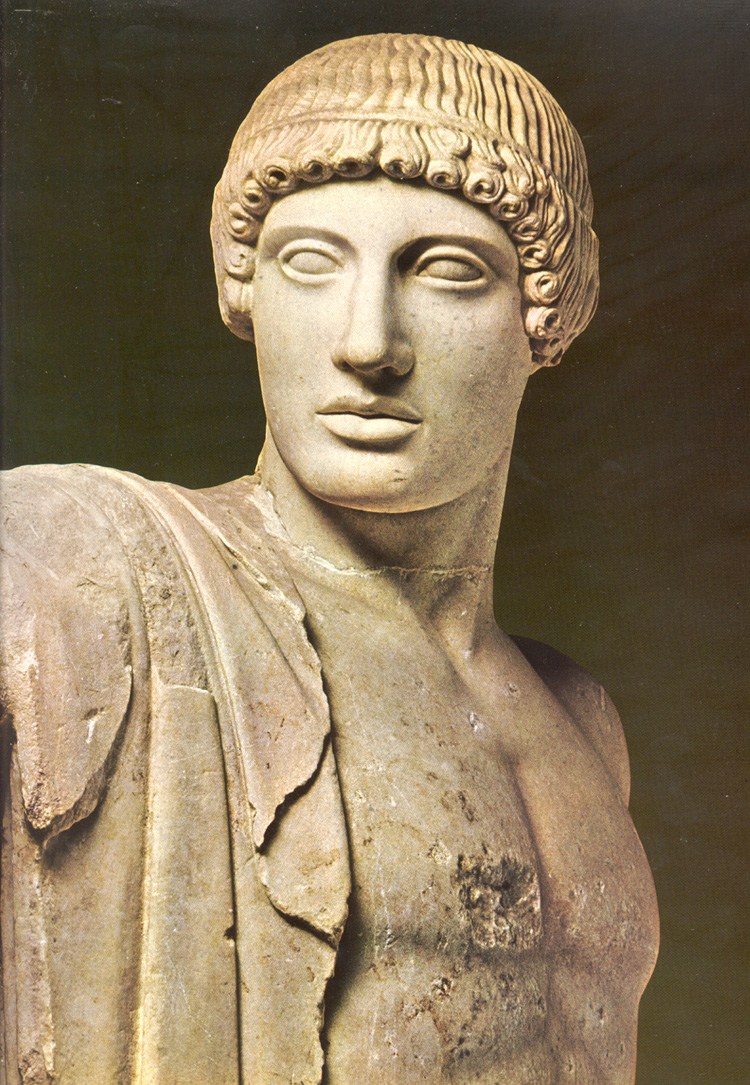
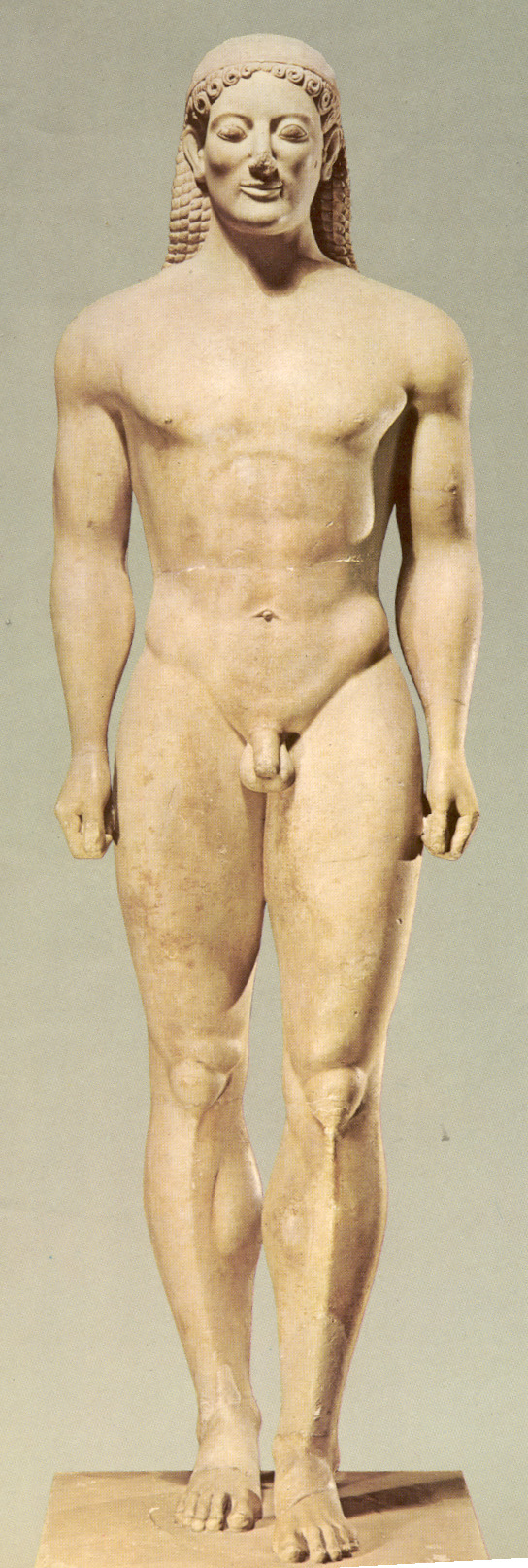
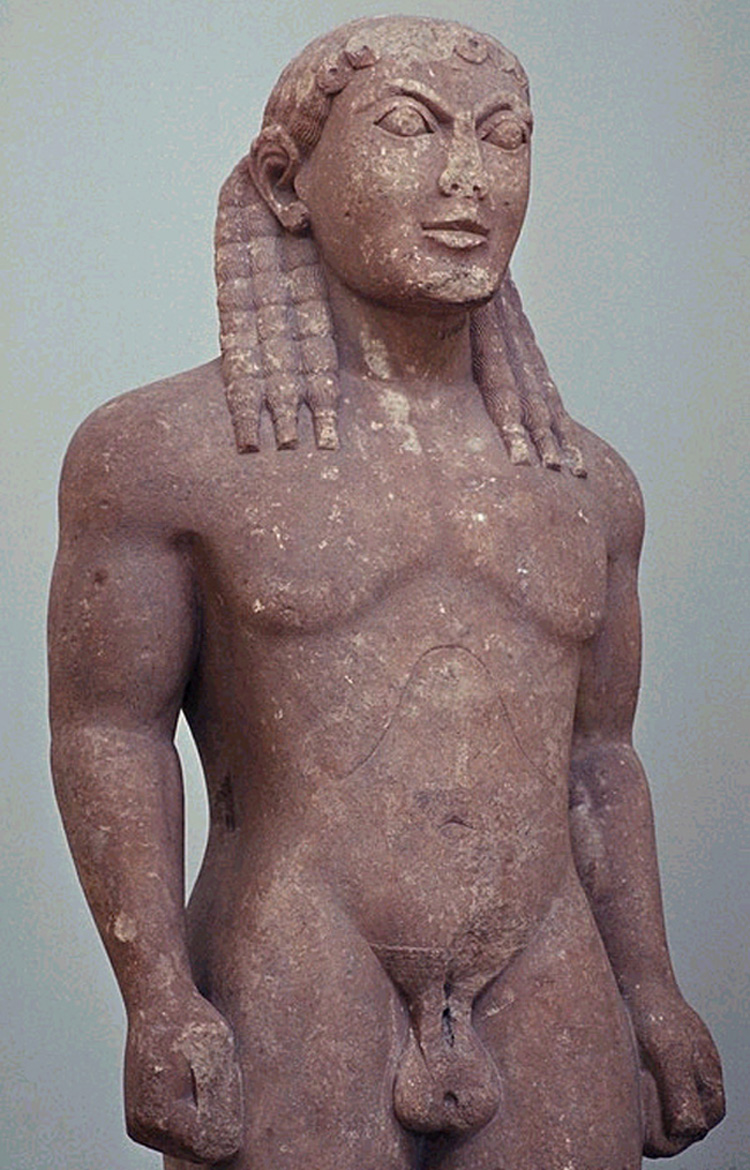
There is competition but we all realize that the winner belongs to us.
Is part of us and we belong to him....am I on track, Bill.
This is instinctive for me. I have always tried to create a "tribe". I thought it was because I'm prior military but after reading your site it may just be instinctive for me.
Yes that is what I meant. They won't get close.
Like with anything I do I have really focused on this subject
and the feeling 'lost' is because the more I think about it the more I see the damage that has been done.
the forthright, simple, uncorrupted, noble son of nature, without
guile, strong in the purity of the yearning of his heart;
I felt lost first because I didn't understand.
Now that I'm understanding more I don't personally feel lost but I feel lost by the overwhelming effect of what I'm understanding on a society as a whole.
Like the movie 'The Matrix' or in the religious teachings of Gnosticism that we are all asleep, is what I see.
What Joe and I discussed yesterday was that we have no culture anymore.

My opinion is that a culture is only a culture if it is expressed from the internal.
This is what you and I are talking about. Our American 'culture' is from outside to internal, an indoctrination.
It isn't a culture.
Joe and I were talking about the fact that we have the Greek 'code' in us.
He said that I'm warrior like because I will fight on every front if I believe there to be an injustice.
Aristotle's own words are quite clear. They show that he was thinking
chiefly of acts of moral heroism. A man who loves himself will (he
thought) always be ready to sacrifice himself for his friends or his
country, to abandon possessions and honours in order to 'take
possession of the beautiful'. The strange phrase is repeated: and we
can now see why Aristotle should think that the utmost sacrifice to an
ideal is a proof of a highly developed self-love. 'For,' he says,
'such a man would prefer short intense pleasures to long quiet ones;
would choose to live nobly for a year rather than to pass many years
of ordinary life; would rather do one great and noble deed than many
small ones.'
I seek justice.
My whole history is like that. I was an exchange student to Germany, then I joined the military, then I became an environmental scientist to fight for the environment, I came out boldly, my first partner Steve had Hiv and I fought that,
I just joined the Vaccine trials for HIV in Birmingham which scared the shit out of everyone I know except Joe. I don't have HIV so I was
able to receive the vaccine in order to see how my body reacts to it and
compile information. My mother told me that I may as well go play with
rattlesnakes.
Now I'm about to finish law school in 7 months.
I'm naturally a fighter and I fight for the greater good. Joe and I discussed that we are like Spartans even though we never were exposed to their culture we carry the 'code' of their culture. I thought this was
interesting.
Brother Bill, If I seem to run on and not seem focused it is because I am
overwhelmed at the moment just as you are.
I'm in the middle of bar review so that I can pass the Bar here which is a very hard bar.
I love what I'm learning from you.
I honor you,





Male sexual desire for men cannot be tied down to a minority group. Rather it is a universal male phenomenon, especially strong amongst masculine identified men.
kalokagathia in its pure state is, we understand, the highest
principle of all human will and action, the ultimate motive which
works with its own inward necessity, and at the same time the ground
for all that happens in nature.


And we can call it not simply "a" Strife of Valour, but "The" Strife of Valour -- because that's how it's experienced by its participants.


Now -- bear with me.
What we saw both in Excellence, Honor, and the Molding of Men, and in The Strife of Valour --
is that for the Greeks, Virtue, Valour, Manhood -- are synonymous.
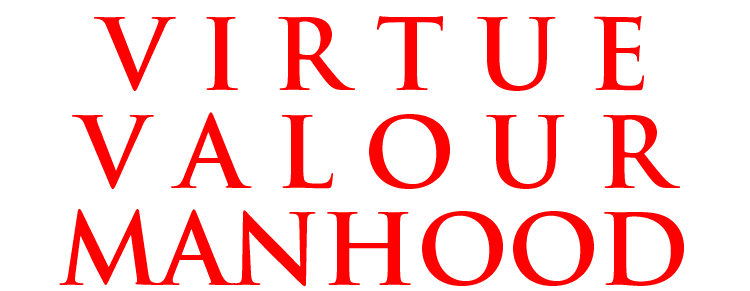
Which means that if Eros is The Strife of Valour, it's also The Strife of Virtue:


And a Strife of Manhood; indeed, The Strife of Manhood:


Eros then is The Strife of Manhood.
And its physical expression must be that of Manhood against Manhood --
Phallus against Phallus.
There's the Strife of Valorous and Virtuous Man against Man;
and the Strife of Valorous and Virtuous Phallus against Phallus.
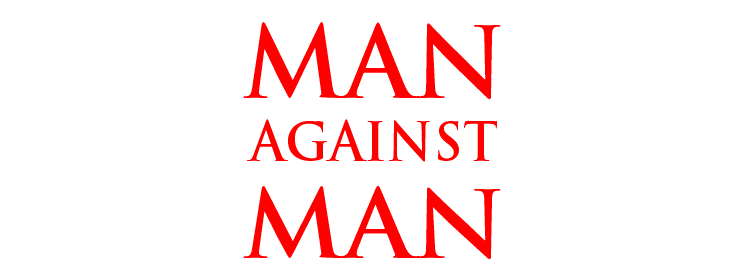
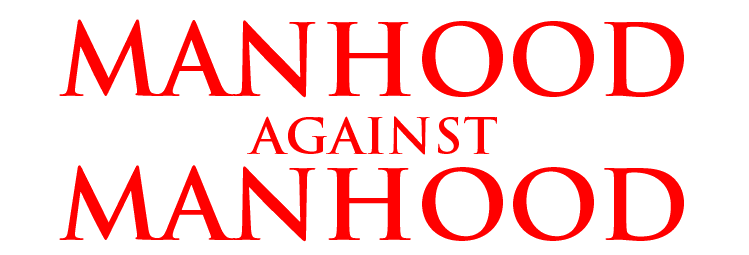
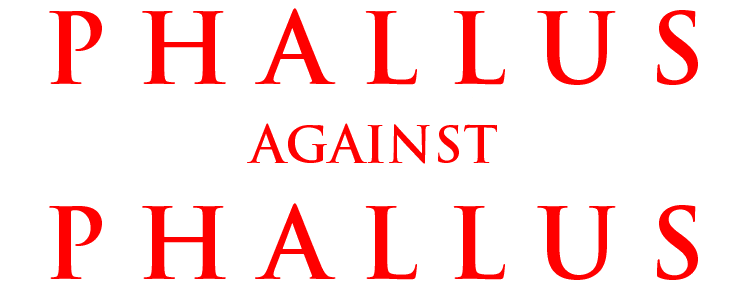
Far-fetched?
No.
Remember that to the Greeks, the genitals -- aidoia -- are to be treated with reverence and awe;
and that the Phallus itself is sacred.
Remember that there are herms -- phallic symbols -- at every major crossroads in a city like Athens; and in every palaistra -- Fight School:

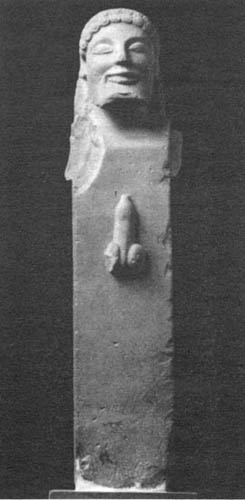
|
Herms were found throughout Greek life -- at crossroads, in temples and other sacred places, in private homes, and in every palaistra.
The Herm was a block of stone with a head of Hermes at the top and an erect phallus carved into the base.
The presence of a herm in every palaistra made explicit the connection between the striving to excel, the striving for excellence, in Fight Sport -- and male sexuality.







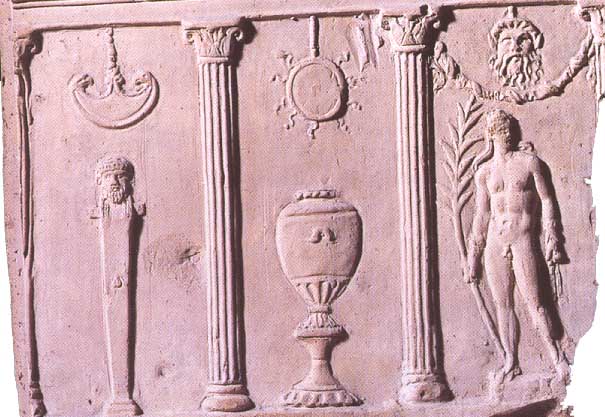
|
A boxer stands victorious in the palaistra.
On the left is a herm -- unfortunately, the phallus has been broken off.
The boxer holds a palm branch and a ribbon, both signifying victory, and wears a boxing glove on his left arm.
Notice that the boxer's genitals and those of the herm are at the same level.
1st century AD Roman terracotta.
And in this statue, which I often show you, of a victorious boxer, a herm is also present:
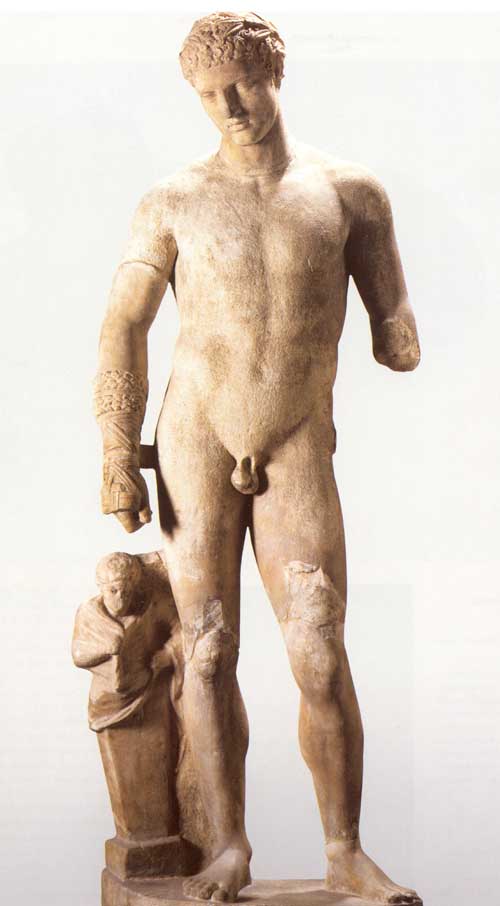
The herm is partially draped, and the boxer leans against it companionably as he gazes serenely down at the supine body of his defeated opponent:
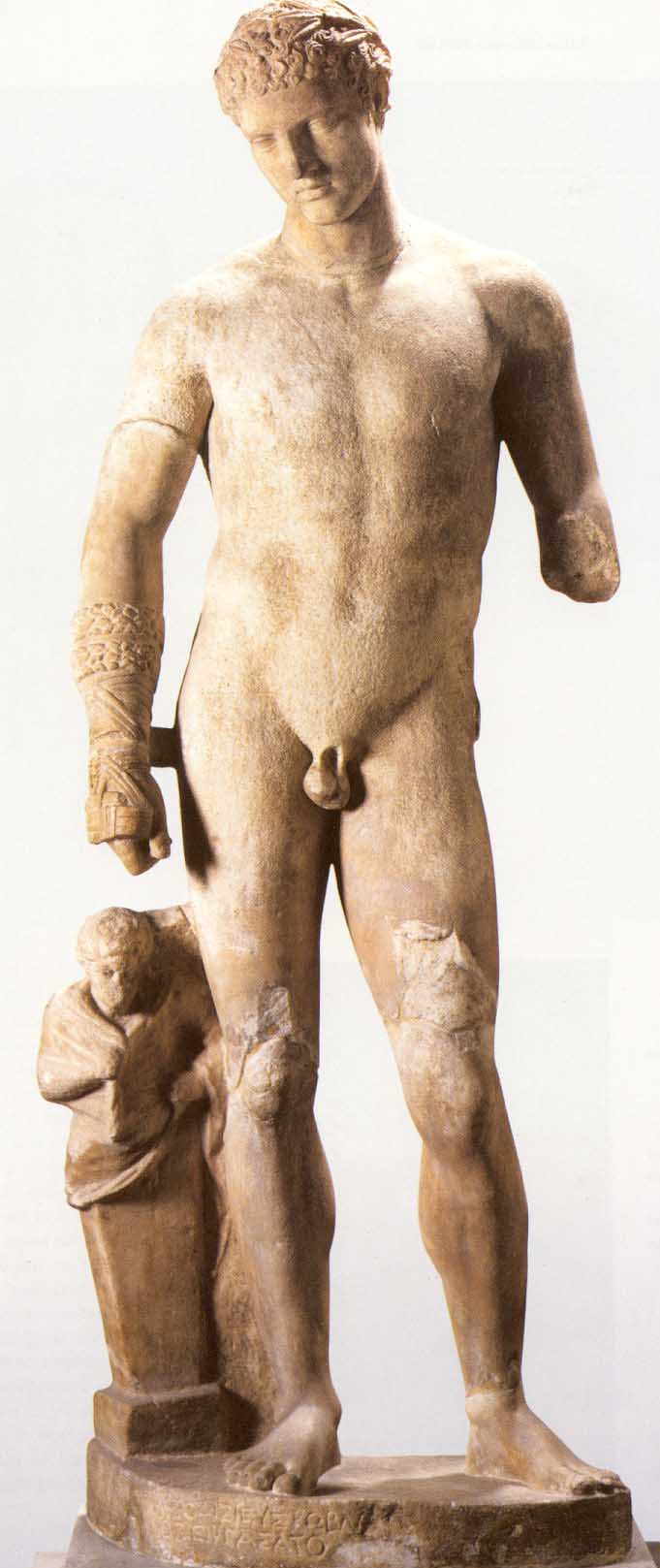
So: herms are ubiquitous in the Greek world, and are strongly associated with nude male athletics and in particular with nude male Fight Sport.
And we see that very clearly in the Roman poet Statius, in his description of the Spartan Warriors who are about to march against Thebes:
[Warriors from] steep Taygetus [a mountain near Sparta]
And hardy squadrons from Eurotas [Sparta's principal river] where
The white swans breed. [Zeus came to the Lakonian matron Leda in the guise of a swan and fathered the Spartan heroes known as the Dioscuri -- thus the swan is another symbol of Lakon -- Sparta.]The god of Arcady [Hermes]
Himself had reared them in the dusty ring [of boxing, wrestling, and pankration]
And trained them in the ways of angry war
And naked valour; hence their high resolve
And sweat the sacrament of glorious death.

Hermes -- who is present in the palaistra as Herm -- has trained these guys in the ways of angry war and naked valour -- since they fight, that is, display male virtue, in the palaistra, in the games, and in battle, nude --
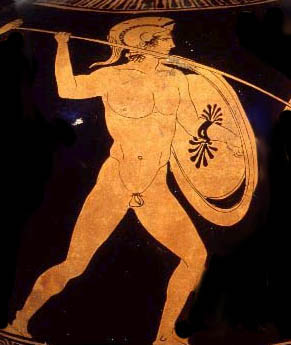
and that training has given them high resolve -- "Never retreat, never surrender" is the Spartan credo --
"And sweat the sacrament of glorious death."
As I discussed in my reply to the Blacksburg message thread, the Greeks -- and also the Romans -- regarded a glorious death in battle as wiping "clean at one stroke all previous flaws in a man's life."
Then Statius adds that
Parents are gladdened by their children's fate
And urge them to their doom ["Come back with your shield or on it!"]; the young men all
Are shedding tears, the mothers well content
To lay the wreaths [the mothers of Spartan Warriors are content to do their duty; the young men are more emotional, and cry openly.]Reins in their hands they hold
And javelins, a pair, with thongs attached;
From huge bare shoulders [the Spartans claimed that the way they bred warriors, plus the agogé and the athleticism of their women, resulted in men who were bigger and stronger] hangs a shaggy cloak [the Spartan Warrior's single red cloak, which became "shaggy" from wear],
Swans' feathers crown each crest.
So this is Statius' take, writing ca 90 AD, on the Spartan ethos:
Hermes -- Herm -- Phallus -- has trained these Men in the ways of
Naked valour, high resolve, and sweat the sacrament of glorious death.
The presence of the Herm in the palaistra -- scene of both male-male aggression and male-male attraction -- is thus a reflection of the Greeks' instinctive understanding of what we in the Alliance call natural male sex aggression;
which we describe as
the hormonally-mediated tendency of males to
- behave at once aggressively and erotically towards other males;
- become sexually aroused by fighting; and,
- seek to in some way combine fighting and sex.
So -- to the Greeks, what we term natural male sex aggression would have been fundamental, and fundamentally understood.
But not in a profane sense.
For these people, the Greeks, the Phallus is literally, as Danielou says, the sacred symbol of Man's creative power.
They don't think of it as we've been taught to, as something dirty or profane.
Not at all.
To them, it's sacred.
And must be used accordingly.
Now -- I said "the Phallus."
But actually, of course, the genitals are the Phallus and Testicles, and the latter are also tremendously important to the Greeks, as we can see in their art:

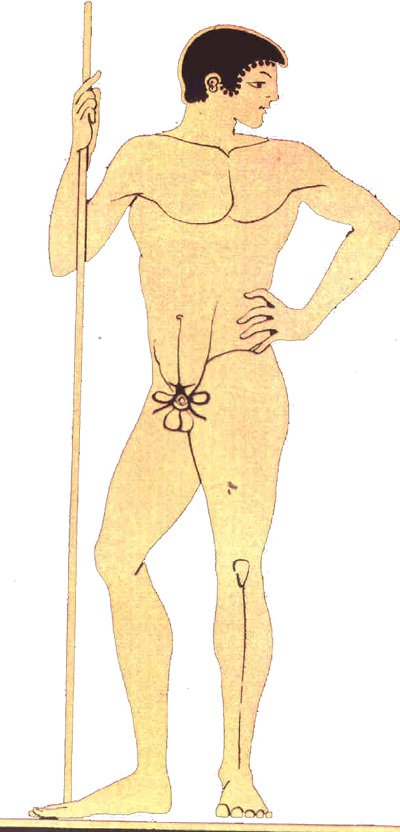
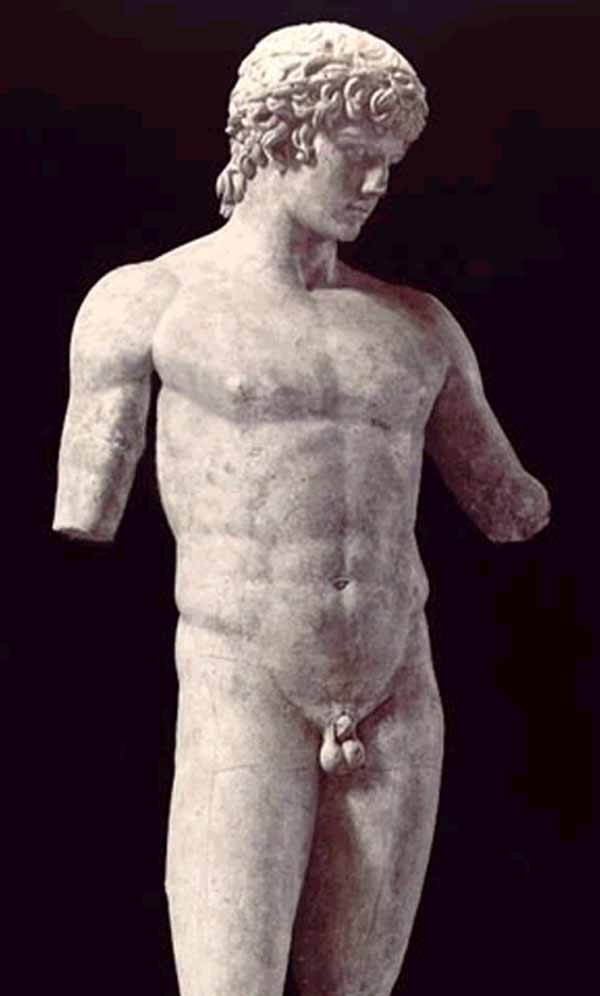
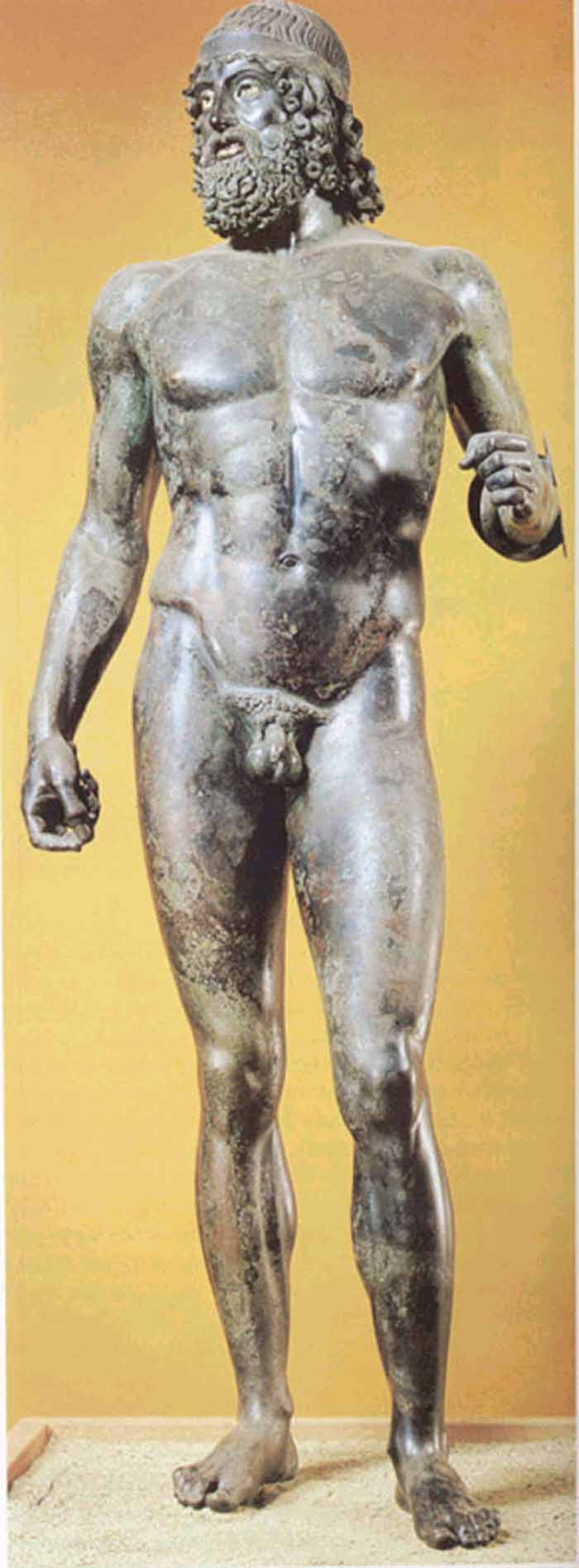
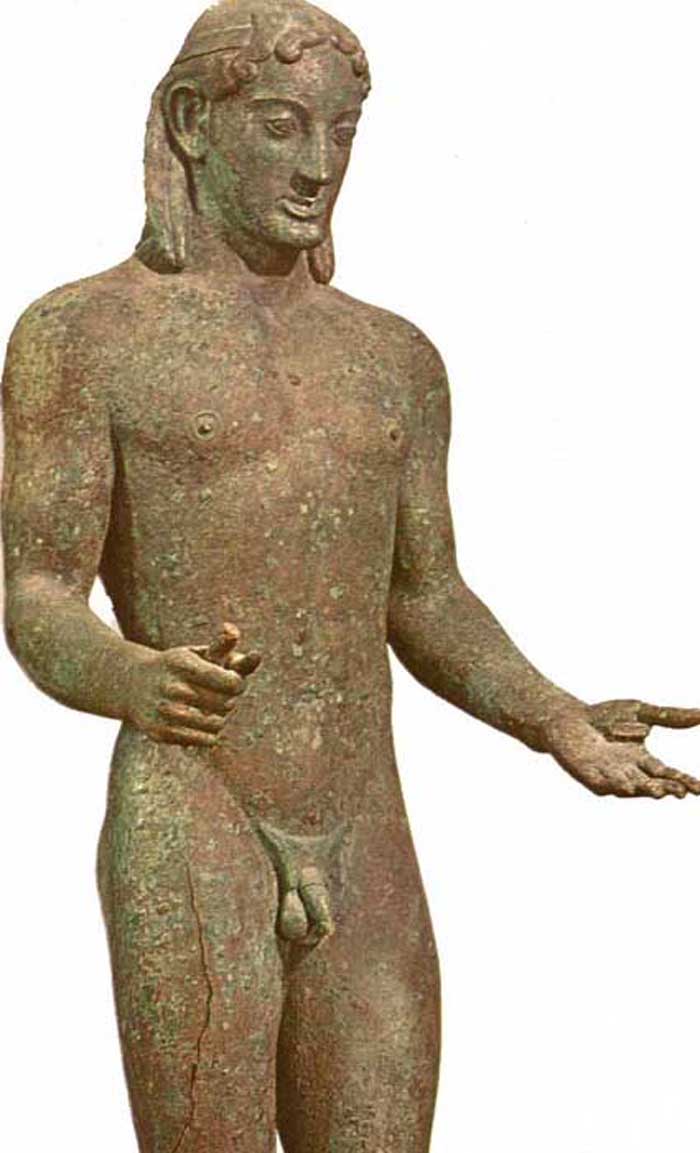
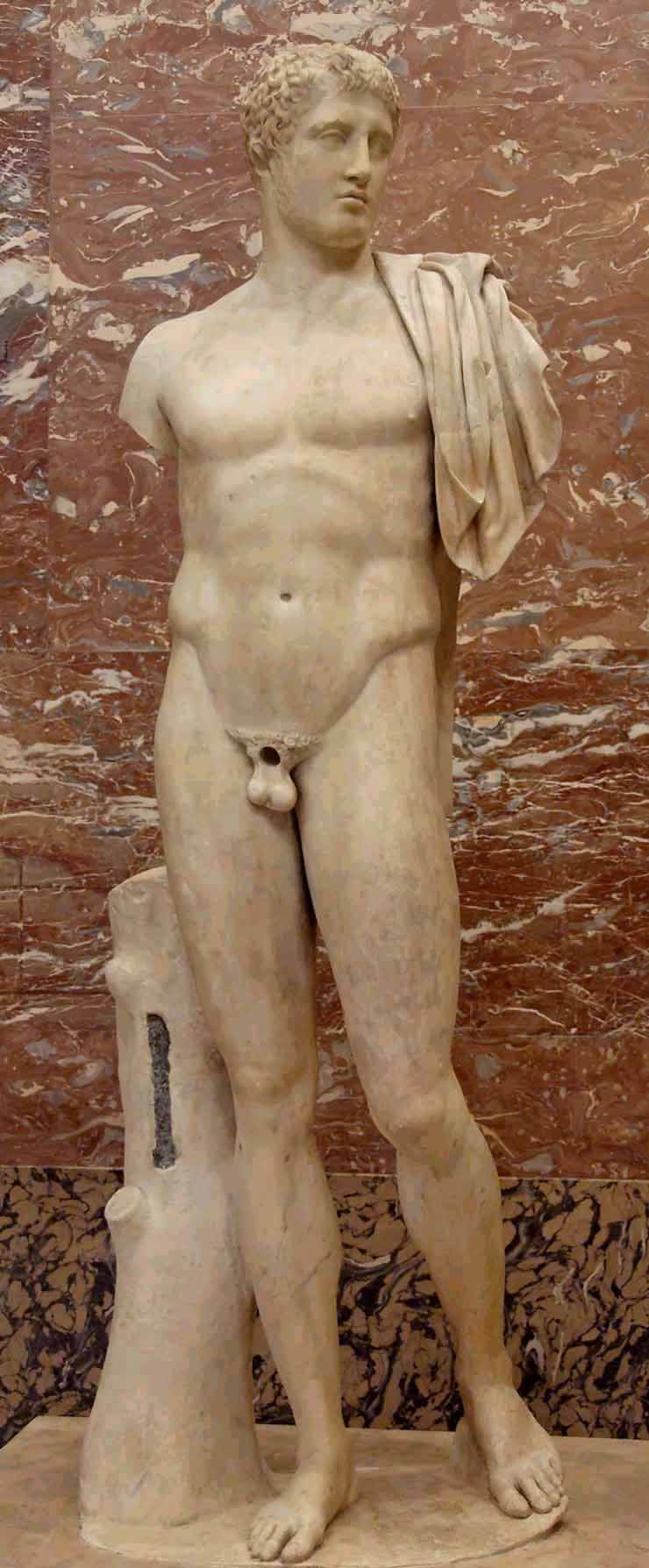
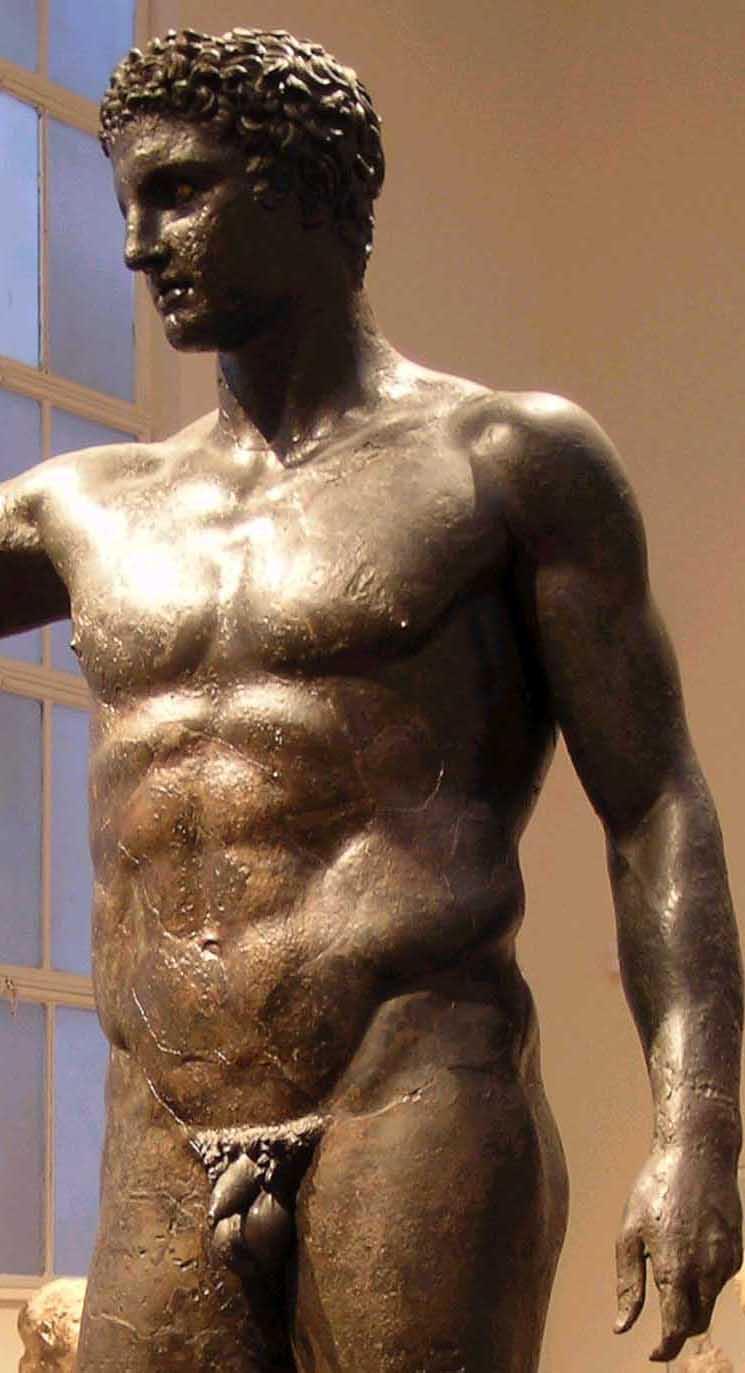
So -- the genitals are, as we say, a "package" -- both penis and testicles matter;
and the Greeks do not, as we often do in our depiction of the male genitals, emphasize the delivery system -- the penis -- over what's to be delivered -- the contents of the testicles.
For example, in this sculpture of a circus strongman by 20th-century American artist Alexander Calder,
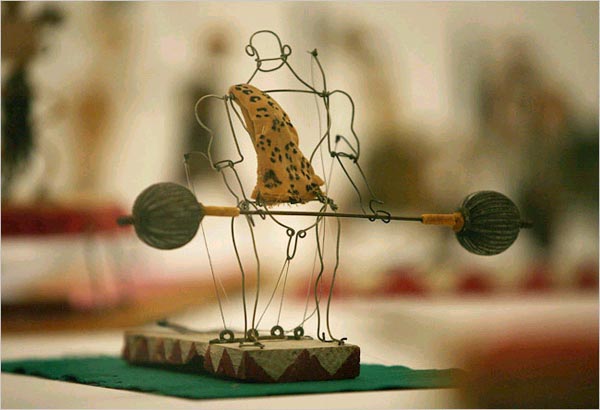
the testicles have shriveled and shrunk -- almost to the size of bb's -- while the penis is the size of a phallus.
As though only the penis matters.
Of course Calder means to be witty here, and that's all well and good.
Yet the fact is that the strongman -- indeed, any and every Man -- derives his strength from his testicles, not from his penis.
The testicles are prominent in the Greek depiction of the male genitalia because the Greeks understand that -- they understand how important the testicles are.
Just as they also understand that the "heterosexual" use of the genitals is to be procreative.
In Greek myth that's quite clear.
The male gods frequently have sex with mortal women;
and when they do -- a child is always the result.
In Greek myth, sex between a male and female is always procreative.
While sex between male and male is meant to be part of the striving for moral beauty -- for excellence, virtue, valour, and manhood.
Which is why the Greeks are so opposed to anal penetration -- it's an act which degrades manhood and which exposes the phallus to "kakos" -- to evil -- by burying it in kakke -- human ordure, human waste.
That could not be more clear.
The Greeks believed, per Plato, that "between the moral and the physical cosmos there is perfect harmony."
As we said, if that cosmos includes the Love of Man for Man -- which it does --then the physical expression of that Love must be morally harmonious.
It must be noble and beautiful -- kalos; and good and brave -- agathos.
It must not be kakos -- evil, cowardly, and ugly; and because the word and concept of kakos derives from the word and concept of kakke -- shit --
anal penetration cannot ever be part of Eros.
Nor can infidelity.
The Striving for Moral Beauty which not only characterizes but defines male-male Love -- Eros -- is a striving for excellence, virtue, valour, and manhood.
It's a Striving and a Strife of Valour -- of Virtue -- and of Manhood.
And, once again, it's in exactly those terms that Jaeger describes it:
It is very significant that the first time we have an opportunity of studying the Dorian [the Spartans were Dorian] aristocracy closely we should find that homosexual love is the ruling motive in their character.
...
It is, after all, easy to understand how a passionate admiration of noble bodies and balanced souls could spring up in a race which for countless years had prized physical prowess and spiritual harmony as the highest good attainable by man, and which had striven by grave and ceaseless rivalry, by exertion involving the utmost energies of mind and body alike, to bring those qualities to the greatest possible perfection. Men who loved the possessors of those enviable qualities were moved by an ideal, the love for areté [excellence, valour, virtue]. Lovers who were bound by the male Eros were guarded by a deeper sense of honour from committing any base action, and were driven by a nobler impulse in attempting any honourable deed.
The Spartan state deliberately made Eros a factor, and an important factor, in its agogé.
[emphases mine]
So -- Jaeger repeats Xenophon's core point about The Strife of Valour -- in talking not about Fighting, but about Love.
Xenophon: The Strife of Valour is the
kind of strife that is dearest to the gods, and in the highest sense political -- the strife that sets the standard of a brave man's conduct; and in which either party exerts itself to the end that it may never fall below its best ...
Jaeger: Male lovers have
striven by grave and ceaseless rivalry, by exertion involving the utmost energies of mind and body alike ...
Xenophon says the Strife of Valour is the kind of strife which is "dearest to the gods."
Jaeger speaks of a quest for both physical prowess and spiritual harmony.
While Plato says that a male lover is "a friend inspired by God."
And that's how you need to conceptualize male-male Love -- Eros -- always, and throughout every aspect of your Manly life.
A Strife of Valour, of Virtue, and of Manhood, a quest for both physical prowess and spiritual harmony, inspired by God, and dear to the Gods.



Now -- let's talk further about these Greek ideas of high-mindedness and Areté.
In The Strife of Valour I discussed how our society has been run for years on the values of greed and the market-place; and how the Spartans, in the person of their law-giver Lycurgus, had rid their society of those values and replaced them with areté -- nobility and goodness.
I know that to many Americans today that's incomprehensible.
Indeed, most commentary I've read about the economic crisis, particularly that written by Americans, has waxed moralistic about the alleged abuses, and then waned into defense of the American system.
International Herald Tribune op-ed writer Roger Cohen, for example, a couple of whose columns I cited in The Strife of Valour, was briefly indignant about the follies of the housing bubble, but quickly fell back into his usual posture, which is that of apologist for "free-market capitalism."
In one column which, predictably, praised actor Sean Penn for his role in the "gay"-themed movie "Milk" and attacked actor Sean Penn for visiting Cuba and lauding Castro-style socialism, Cohen said,
I asked Christopher Hitchens, who accompanied Penn but was snubbed by Castro, why the actor was in the thrall of Castroism. "A lot of people cannot believe there is no alternative to free-market, bourgeois democracy," Hitchens said.
Well, while no doubt there's much wrong with Castro and Cuban-style socialism, Hitchens' statement, so approvingly quoted by Cohen, is risible.
In the eighteenth century, a man like Hitchens would have been sententiously announcing, apropos young capitalist insurgents like Adam Smith, that "A lot of people cannot believe there is no alternative to mercantilism and monarchism."
Fact is, there are always alternatives.
Always.
Free-market capitalism, modified by the state in varying degree, is today's dominant economic paradigm.
It won't always be, and there are other paradigms currently extant.
Alternatives.
Cohen likes to contrast the vibrant nature of American society with what he presents as a stuffier European culture.
Sure, the Europeans do a better job of taking care of their people, he says, but at the price of vibrancy and innovation.
He attributes that to America's more free-wheeling form of free-market capitalism.
Conveniently ignoring a host of historical factors, of which he has to be aware, since he was born and raised in Europe, that make the European and American experiences very different.
First and foremost being the absence in America and presence in Europe of a landed, titled, aristocracy.
We have rich families in America, but we don't have Lords and Ladies -- and it's unlikely we ever will.
And that's a huge part of the difference.
European society is more hierarchic -- because there's more hierarchy.
And thus in theory less open to change.
And yet -- the Europeans have been ahead of us in many areas of change -- such as greening their economies; and making healthcare which is affordable both to the nation and the citizen -- available to all.
That too is change, whether Mr Cohen wishes to acknowledge it or not.
And much of the EU has done a far better job of chasing that change -- than has the US.
The reason for that, of course, is that in the US, we've consistently put individualism and in particular individual greed ahead of communal values.
Communal values.
Values which matter -- and which have, historically, predominated.
Yet our entire society runs on greed -- individual greed -- and rewards that greed.
We're told that such a system is best at giving people what they need.
Yet our society isn't about giving people what they need.
If it were, if that were the case, everyone would have decent housing and good medical care and clean air and pure water and healthy food and so forth.
Because that's what people need.
Rather, much of our society is about inventing needs and then -- filling them.
And the needs are almost all about material possessions.
The vast majority of which -- NO ONE needs.
In our society we invent those things, manufacture them, sell them, buy them, use them, and then destroy them.
In the process doing great damage to both the natural environment, without which we cannot live, and ourselves.
Yet we continue to be encouraged to be greedy -- for things.
Obviously this has a great impact in many areas of life, not just the marketplace, because when greed is so consistently celebrated, it and its bedmate wealth become the primary values -- everywhere.
Leaving folks who aren't wealthy to feel, as Judith Warner pointed out in a recent blog, like losers.
In addition, as Warner noted in a subsequent blog, the Greed theory has extended itself into other areas of endeavor, including medical and other scientific research -- where it's had a devastating effect.
So -- a dominant paradigm like that one -- has a pervasive influence.
It affects many areas of life -- not just one.
Values and paradigms -- models -- matter.
Was greed a value among the ancient Greeks?
No.
Was wealth?
Not at all, and not ever.
In Plato's Phaedrus, in what is a very charming scene, the title character and Socrates are walking together in the countryside outside Athens' city gates.
It's a warm summer day, and they're both barefoot.
Phaedrus remarks that he's not wearing his sandals, and that Socrates doesn't ever wear sandals.
Because he doesn't own them.
So the two guys, student and teacher, walk to a nearby stream and dangle their feet in the water while having one of the most important conversations about Love -- in the Western canon.
It's important of course because of Socrates.
Socrates -- who doesn't even own a pair of sandals.
And whose going barefoot is not simply a matter of warm summer weather.
We know that because it's a point repeated by the young, handsome, rich, and ultimately traitorous Alcibiades in Plato's Symposium, where Alcibiades observes that on a winter campaign with the Athenian army, he saw Socrates barefoot on the ice, and "marching better than any of the other soldiers."
So -- Socrates doesn't own a pair of sandals, and goes barefoot summer and winter.
Yet his is easily the most influential mind in all of Western culture.
You have to wonder what Socrates would make of our obsession with shoes --
athletic shoes in particular.
And the fact that the most popular brand of those shoes is named for the Greek goddess Nike -- Victory.
Which is odd, at best, because the victors whom Nike crowned -- competed barefoot:
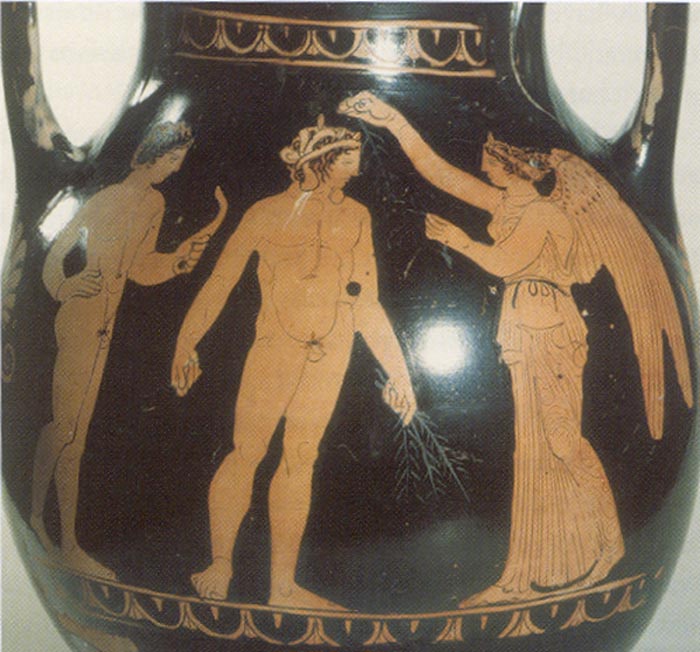
Nike crowns a barefoot Victor who's attended by another barefoot athlete
Indeed, in this painting, which I'm adding so that you can get another view of a Herm, Nike herself is barefoot:
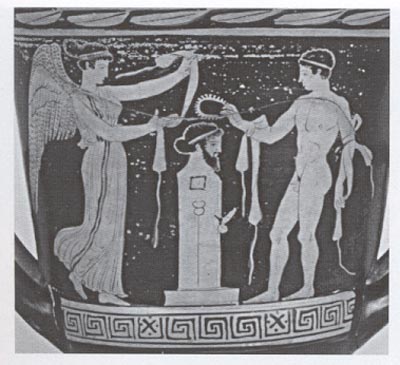
Nike and a victorious athlete crown a Herm and garland it with ribbons,
implying that the Herm is the source of the athlete's victory.
Note that the Herm's eyes and erection point towards the athlete's genitals
Of course, in statues and paintings, the gods are usually barefoot -- and that's not surprising.
They were modeled after all on athletes.
And athletes, as Prof Andronikos tells us, competed unfettered by any element foreign to their bodies.
That is to say, nude, and barefoot.
They didn't need fancy shoes, and they most certainly didn't need clothes slathered in product endorsements, in order to compete.
Here's another example -- it's one I cited in The Strife of Valour, and it's from Plutarch's Life of Lycurgus, the legendary or not-so-legendary Spartan lawgiver:
...there was a dreadful inequality in this regard, the city [Sparta] was heavily burdened with indigent and helpless people, and wealth was wholly concentrated in the hands of a few. Determined, therefore, to banish insolence and envy and crime and luxury, and those yet more deep-seated and afflictive diseases of the state, poverty and wealth, Lycurgus persuaded his fellow-citizens to make one parcel of all their territory and divide it up anew, and to live with one another on a basis of entire uniformity and equality in the means of subsistence, seeking preeminence through virtue alone, assured that there was no other difference or inequality between man and man than that which was established by blame for base actions and praise for good ones.
~ translated by Bernadotte Perrin
So: "there was a dreadful inequality ... the city was heavily burdened with indigent and helpless people, and wealth was wholly concentrated in the hands of a few."
Sound familiar?
Lycurgus was "[d]etermined, therefore, to banish insolence and envy and crime and luxury, and those yet more deep-seated and afflictive diseases of the state, poverty and wealth..."
With what did Lycurgus replace poverty and wealth as dividers and demarcators in his society?
Answer: "preeminence through virtue alone" expressed as "blame for base actions and praise for good ones."
Basically then, the value system he established and which was welcomed by the Spartans was based not on poverty and wealth, which are after all functions of greed, but on areté -- excellence:
there was no other difference or inequality between man and man than that which was established by blame for base actions and praise for good ones
That's a value system which centers on areté aka moral beauty aka nobility and goodness aka moral heroism:
a man is praised for his good or noble actions -- which add to his areté -- and blamed for his base or ignoble actions -- which subtract from his areté.
This is an idea which runs throughout Plutarch, who was a prolific author and a very representative exponent of the value system of his day and of the ancient world.
For example, here's Plutarch on the Theban heroes Pelopidas, 410?-364 BC, and Epaminondas 410-362 BC -- all from his Lives of the Noble Grecians and Romans in the Dryden translation:
Pelopidas came from a wealthy family; his great friend, Epaminondas, was poor: he "made his familiar and hereditary poverty more light and easy by his philosophy and single life." Pelopidas could never persuade Epaminondas "to be a sharer in his wealth. He, however, stepped down into his [Epaminondas'] poverty, and took pleasure in the same poor attire, spare diet, unwearied endurance of hardships, and unshrinking boldness in war."
"Both seemed equally fitted by nature for all sorts of excellence; but bodily exercises chiefly delighted Pelopidas, learning Epaminondas; and the one spent his spare hours in hunting and the palaistra [wrestling school], the other in hearing lectures or philosophising."
They were together in every battle, and when it appeared Pelopidas had been slain, Epaminondas "advanced to defend his arms and body, and singly fought a multitude, resolving rather to die than forsake his helpless Pelopidas."
So: Pelopidas could never persuade Epaminondas "to be a sharer in his wealth. He, however, stepped down into his [Epaminondas'] poverty, and took pleasure in the same poor attire, spare diet, unwearied endurance of hardships, and unshrinking boldness in war."
Epaminondas, who is one of Plutarch's heroes, chooses poverty.
Pelopidas, another of Plutarch's heroes, chooses to share that poverty with him.
Together, the two experience "the same poor attire, spare diet, unwearied endurance of hardships"
Poor attire and spare diet are all well and good to the Greeks -- the Spartans boasted of both -- but "unwearied endurance of hardships" is considered really important.
Guys, there's a Greek word for the sort of hardships encountered when hunting -- this is in the ancient world, and they're not hunting from the backs of pick-ups -- or at war.
The word is "ponos," meaning "hardship and exertion" -- and it's valued.

That's why we see these scenes of Men hunting:
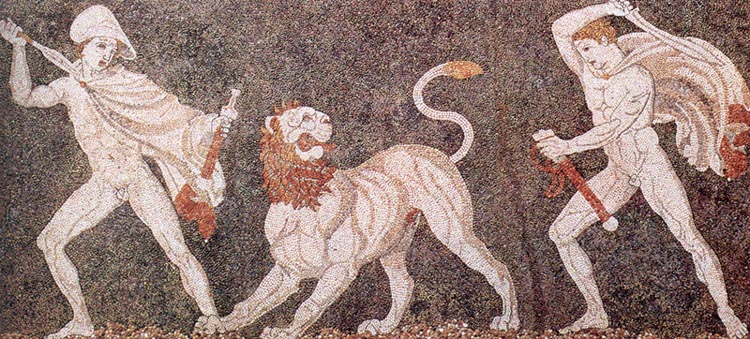
And you'll notice that they're hunting in nude, male, pairs.
Hunting, like Fighting, like Wrestling, like Eros, is another Nude, Male, Dyadic, activity.
And, like I said, it's valued.
Valued because it's educative.
In the moral sense.
In his treatise on hunting with hounds, the Cynegeticus, Xenophon, the pro-Spartan Athenian military man who we discussed at length in The Strife of Valour, argues, says Jaeger, that there's a "close connection between hunting and the training of young men in kalokagathia [nobility and goodness]" -- that is, that ponos, the hardship endured in hunting, builds character.
Here's part of what Xenophon says:
Game and hounds are the invention of gods, of Apollo and Artemis. They bestowed it on Cheiron [the Centaur] and honored him therewith for his righteousness. And he, receiving it, rejoiced in the gift, and used it. And he had for pupils in venery and other noble pursuits [many great mythological heroes, including Achilles and Theseus], of whom each in his time was honoured by gods. ...
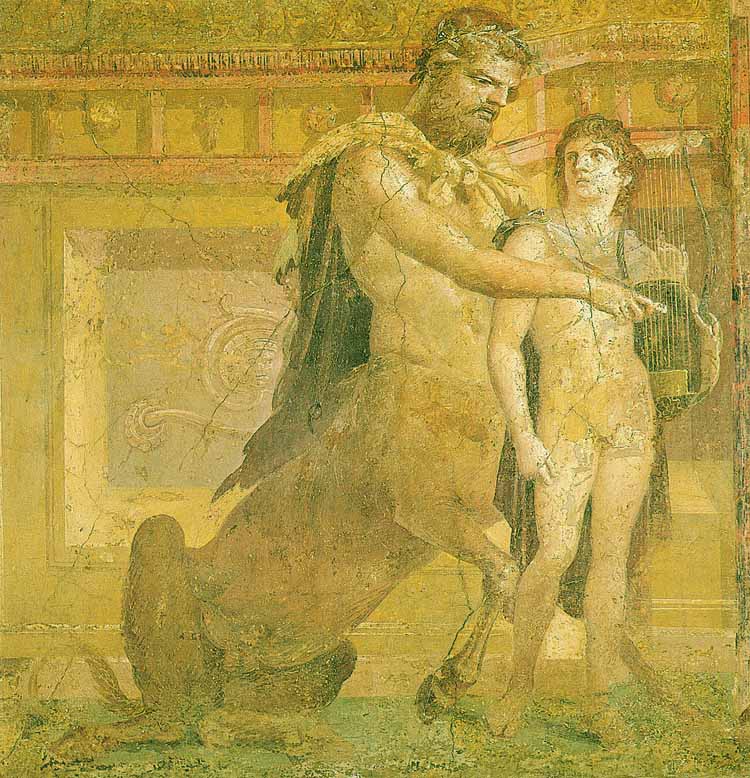
Cheiron and Achilles
Through the heed they paid to hounds and hunting and the rest of their scholarship, they excelled greatly and were admired for their virtue [areté].
...
Achilles, nursed in this schooling, bequeathed to posterity memorials so great and glorious that no man wearies of telling and hearing of them.
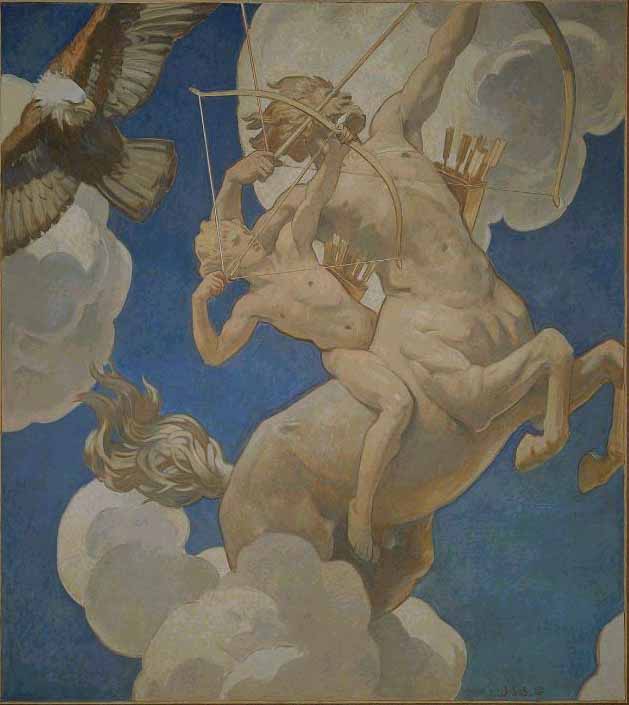
Cheiron and Achilles
These [heroes], whom the good [agathoi] love even to this day and the evil [kakoi] envy, were made so perfect through the ways they learned of Cheiron that, when troubles fell upon any state or any king in Greece, they were composed through their influence ; or if all Greece was at strife or at war with all the Barbarian powers, these brought victory to the Greeks, so that they made Greece invincible.
Therefore I charge the young not to despise hunting or any other schooling. For these are the means by which men become good in war and in all things out of which must come excellence in thought and word and deed.
...
Xenophon then provides a long discussion of the practical aspects of hunting, including the raising and training of hounds.
And the many dangers men face when hunting animals like stags, and lions -- and boars.
... the man must approach [the boar] spear in hand, and grasp it with the left in front and the right behind, since the left steadies while the right drives it. The left foot must follow the left hand forward, and the right foot the other hand. As he advances let him hold the spear before him, with the legs not much further apart than in wrestling, turning the left side towards the left hand, and then watching the beast's eye, and noting the movement of the fellow's head. Let him present the spear, taking care that the boar doesn't knock it out of his hand with a jerk of his head, since he follows up the impetus of the sudden knock.In case this accident should happen, the man must fall on his face and clutch the undergrowth beneath him, for, if the beast attacks him in this position, he is unable to lift the man's body owing to the upward curve of his tusks ; but if his body is off the ground, the man is certain to be gored. Consequently, the boar tries to lift him up, and, if he cannot, he stands over and tramples on him.
For a man in this critical situation there is only one escape from these disasters. One of his fellow huntsmen must approach with a spear and provoke the boar by making as though he would hurl it ; but he must not hurl it, or he may hit the man on the ground.
On seeing this the boar will leave the man under him and turn savagely and furiously on his tormentor. The other must jump up instantly, remembering to keep his spear in his hand as he rises, for safety without victory is not honourable.
He must again present the spear the same way as before, and thrust it inside the shoulder-blade where the throat is, and push with all his might. The enraged beast will come on, and, but for the teeth of the blade, would shove himself forward along the shaft far enough to reach the man holding the spear.
A risky business.
Xenophon also warns that in hunting deer,
don't go near it. For it will butt, if it's a stag, and kick, and if it's a hind, it will kick. So throw javelins at it from a distance.
Of course, in these mosaics and sculpture, which are from the Macedonian capital of Pella,

the one man is not only near the stag, but is grasping it by its antler.
I'm not sure what that means, but it probably celebrates a particular act of courage by the hunter -- which in the case of the sculpture, we know to be Alexander the Great.
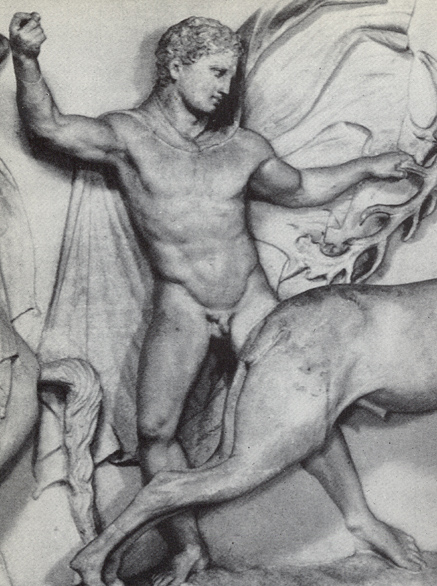
Alexander the Great slays a stag
Notice the correspondence between the genitals of man and stag
After his discussion of the practical aspects of hunting, Xenophon returns to his theme of Virtue:
The better sort [of person] are those who are willing to toil. And this has been proved by a great example. For among the ancients, the companions of Cheiron, to whom I referred, learnt many noble lessons in their youth, beginning with hunting ; from these lessons there sprang in them great virtue, for which they are admired even today.
That all desire Virtue is obvious, but because they must toil if they are to gain her, the many fall away. For the achievement of her is hidden in obscurity, whereas the toils inseparable from her are manifest.
It may be that, if her body were visible, men would be less careless of Virtue, knowing that she sees them as clearly as they see her.
For when he is seen by his [male] beloved, every man rises above himself and shrinks from what is ugly and evil [kaka] in word or deed, for fear of being seen by him. But in the presence of Virtue men do many ugly and evil things, supposing that they are not regarded by her because they do not see her. Yet she is present everywhere because she is immortal, and she honours those who are good [agathous] to her, but casts off the bad [kakous]. Therefore, if men knew that she is watching them, they would be impatient to undergo the toils and the discipline by which she is hardly to be captured, and would achieve her.
~ translated by E C Marchant

Now, notice first off that when Xenophon says, "These heroes, whom the good [agathoi] love even to this day and the evil [kakoi] envy..." --
that the word for "the good" is "agathoi" -- the second part of kalo-k-agathia -- and the word for "the evil" is "kakoi" -- from kakos, which derives from kakke, human ordure, waste, fecal matter.
And that Xenophon repeats that distinction when he says "[Virtue] is present everywhere because she is immortal, and she honours those who are good [agathous] to her, but casts off the bad [kakous]."
Again, this is very common in Greek literature and Greek thought: there's that which is noble and beautiful -- kalos; and good and brave -- agathos; and there's that which is evil, cowardly, and ugly -- kakos.
So that kalokagathia -- nobility and goodness -- is always in opposition to kakos -- evil.
Remember what Jaeger said about Plato's discussion of male-male Love -- Eros -- in the Symposium:
the highest human areté [excellence] was called 'beauty-and-goodness', kalokagathia. This 'beauty' or 'good', this kalokagathia in its pure state is, we understand, the highest principle of all human will and action, the ultimate motive which works with its own inward necessity, and at the same time the ground for all that happens in nature. For Plato holds that between the moral and the physical cosmos there is perfect harmony.Even in the first speeches about Eros, Plato brought out the fact that Eros implies a yearning towards moral beauty : the speakers mentioned the lover's ambition and his anxiety that the beloved should be perfect and attain excellence. That gave Eros his place in the moral structure of society. ...
So -- this concept of kalokagathia -- of beauty and goodness -- and its opposition to kakos -- evil and ugliness -- is not in any way incidental to our discussion -- or Xenophon's.
Kalokagathia is part of the order of nature and of society -- and is intrinsic to the Greek conception of male-male love.
Male-male love is in harmony with nature and with society -- to the extent that and because it's in harmony with the yearning for "moral beauty" -- kalokagathia.
Notice too that Xenophon, who knew Socrates though he wasn't quite a pupil, repeats a point that Socrates makes in the Symposium via the character named Phaedrus:
For a man in love [with another male] would surely choose to have all the rest of the host rather than the one he loves see him forsaking his station, or flinging away his arms; sooner than this, he would prefer to die many deaths: while, as for leaving the one he loves in the lurch, or not succoring him in peril, no man is such a craven that the influence of Love [Eros] cannot inspire him with a courage that makes him equal to the bravest born; and without doubt what Homer calls a "fury inspired" by a god in certain heroes is the effect produced on lovers by Love's peculiar power. Moreover, only such as are in love will consent to die for others.~ Symposium 179
So -- Xenophon says "For when he is seen by his [male] beloved, every man rises above himself and shrinks from what is ugly and evil [kaka] in word or deed, for fear of being seen by him."
While Socrates via Plato asserts that "a man in love would surely choose to have all the rest of the host rather than the one he loves see him forsaking his station, or flinging away his arms; sooner than this, he would prefer to die many deaths: while, as for leaving the one he loves in the lurch, or not succoring him in peril, no man is such a craven that the influence of Love [Eros] cannot inspire him with a courage that makes him equal to the bravest born..."
In both cases, the assumption is that having a Male Lover, and being in a Love relationship with another Man -- being under the influence of Manly Love, that is, Eros -- leads to Virtue.
Eros --> Virtue.
Interesting, isn't it, that Greek culture, which was driven by Virtue, was characterized by same-sex Love.
While our culture, which is driven by Greed, and which puts material possessions above all, is dominated by heterosexual marriage.
And a form of heterosexual marriage in which men are expected to spend virtually all of their time when they're not at their jobs -- with their wives and children.
A male is expected either to be at work -- or with his wife.
In such a culture, males are increasingly effeminized -- because they're cut off from the sort of true contact with other males which they need to develop their Natural Masculinity.
That's exactly what the Romans asserted happened to males who spent too much time in the company of females -- that they became "mollis," soft.
Accustomed to luxury and ease rather than hardship and exertion.
And that in such an environment, Men deteriorated and decayed.
Which is what's happened today.
That doesn't mean that Men should spend no time in the presence of Women -- but that too much of what we call heterosexualization is good neither for Men nor Women.
Here's Jaeger's summing up of Xenophon's views:
Hunting makes a man healthy, makes his eye and ear keen, keeps him from growing prematurely old. It is the best training for war, because it makes him accustomed to do long marches carrying his weapons, to bear rough weather, and to sleep out of doors. It teaches him to despise low pleasures, and like all 'education in truth', it makes him just and self-disciplined. Xenophon does not say what he means by this, but it is obviously the compulsion to learn discipline that he values most highly; and he calls that training, which is enforced by reality, 'education in truth'. This gives a realistic and practical turn to Socrates' ideal. The whole book is inspired by [Xenophon's] admiration for ponos, exertion and hardship, without which no man is properly educated. ... Xenophon was a man who naturally liked hard exercise, and who put out all his strength wherever necessary. Here, if anywhere, he is speaking from personal experience. Ponos is the educational element in hunting. The lofty areté of the ancient heroes, taught by Cheiron, was built up by ponos.
In other words, Virtue is the result of exertion and hardship.

Jaeger adds that the Greeks believed that:
Whenever reality comes into contact with men, it educates them by toiling and suffering (ponos).
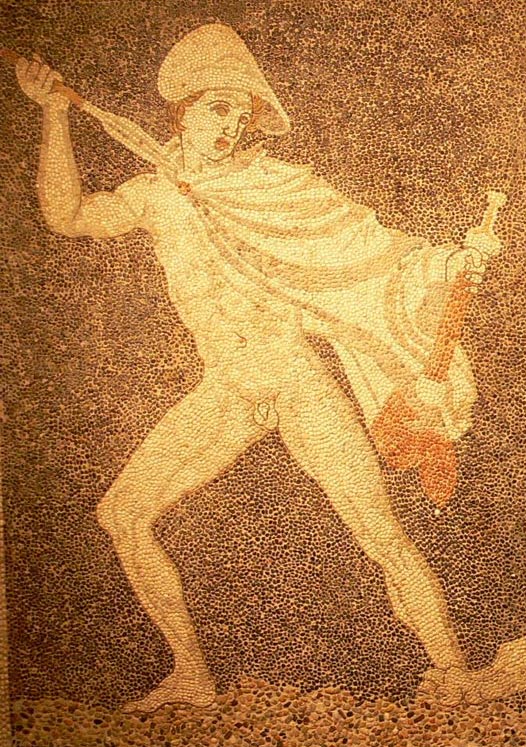
So -- toiling and suffering -- are of value.
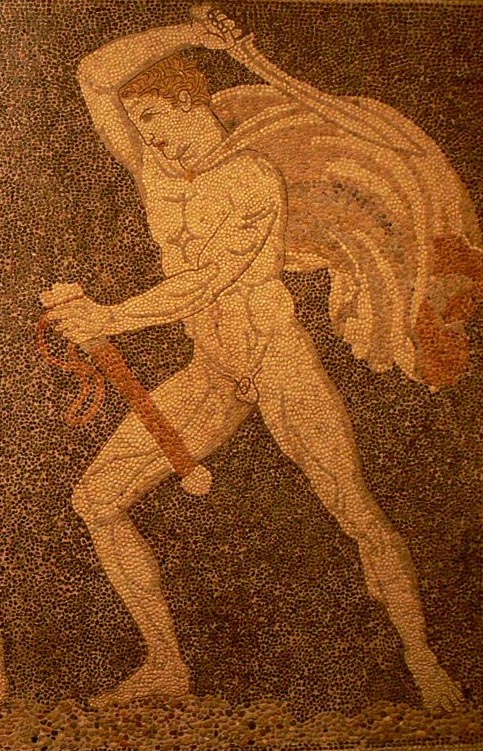
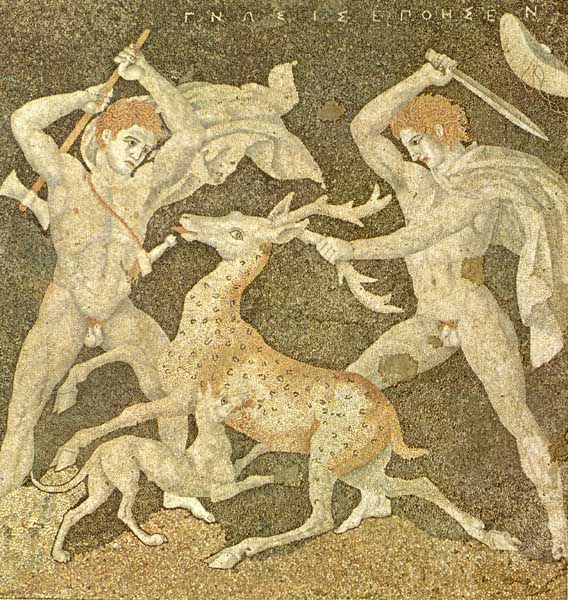
And in Xenophon's treatise on hunting we can see very clearly how the ancient value system works; and how within that system, not ease and not material comfort, but rather toil and suffering and unwearied endurance of hardship, all of which lead to Virtue -- are of value.
Poverty too can be of value.
Which we see, again very clearly, in Plutarch's history of Pelopidas and Epaminondas.
Epaminondas is poor.
He's not, per Tom Wolfe, a Master of the Universe.
Pelopidas, who's rich, voluntarily "steps down" into his friend's poverty, and takes pleasure "in the same poor attire, spare diet, unwearied endurance of hardships, and unshrinking boldness in war."
Pelopidas gives evidence of his areté by stepping down into his friend's poverty.
Epaminondas gives evidence of his areté by making "his familiar and hereditary poverty more light and easy by his philosophy and single life."
"Both seemed equally fitted by nature for all sorts of excellence [areté]; but bodily exercises chiefly delighted Pelopidas, learning Epaminondas; and the one spent his spare hours in hunting and the palaistra [wrestling school], the other in hearing lectures or philosophising."
And both show "unshrinking boldness in war."
Haven't heard anything about greed yet, have we?
Instead what we hear about is voluntary poverty, unwearied endurance of hardships, and --
"unshrinking boldness in war"
"unshrinking boldness in war" is Courage, which is one of the four cardinal or divine virtues.
It was the first virtue to be enshrined by the revolutionary Spartan poet Tyrtaeus, who thundered
I would not mention or take account of a man for his prowess in running or wrestling, not even if he had the size and strength of the Cyclopes and outstripped Thracian Boreas in the race, nor if he were more handsome than Tithonus in form and richer than Midas and Cinyras, nor if he were more kingly than Pelops, son of Tantalus, and had a tongue that spoke as winningly as Adrastus', nor if he had a reputation for anything -- save furious valour.
For no man is good in war unless he can endure the sight of bloody slaughter and, standing close, can lunge at the enemy.
This is excellence, this the best human prize and the fairest for a young man to win.
This is a common benefit for the state and all the people, whenever a man with firm stance among the front ranks never ceases to hold his ground, is utterly unmindful of shameful flight, risking his life and displaying a steadfast spirit, and standing by the man next to him speaks encouragingly.
So -- Tyrtaeus says that he would not take account of man even if he were richer than Midas -- "nor if he had a reputation for anything -- save furious valour."
For no man is good in war unless he can endure the sight of bloody slaughter and, standing close, can lunge at the enemy.
This is excellence, this the best human prize and the fairest for a young man to win.
Furious valour.
Courage.
Which is valued, says Tyrtaeus, because it's "a common benefit for the state and all the people."
A *common* benefit.
Contrast that with columnist Roger Cohen's take on the credit crisis:
No better illustration exists of a culture where private gain has eclipsed the public good, public service, even public decency, and where the cult of the individual has caused the commonwealth to wither.
Private gain, says Cohen, has eclipsed the public good, public service, and even public decency.
And the commonwealth has withered.
Right.
And that's very much the analist ethic -- which is essentially consumerist.
It's the ethic of the condom code.
Everyone has to use condoms, because no one's responsible for anyone else.
Compare that with the behavior of Pelopidas and Epaminondas, whom Plutarch presents as models, and who were models, for the ancient world:
And, amongst a thousand points for praise in both, the judicious esteem nothing equal to that constant benevolence and friendship, which they inviolably preserved in all their expeditions, public actions, and administration of the commonwealth. For if any one looks on the administrations of Aristides and Themistocles, of Cimon and Pericles, of Nicias and Alcibiades, what envy, what mutual jealousy appears? And if he then casts his eye on the kindness and reverence that Pelopidas showed Epaminondas, he must needs confess that these are more truly and more justly styled colleagues in government and command than the others, who strove rather to overcome one another than their enemies.The true cause of this was their virtue; whence it came that they did not make their actions aim at wealth and glory, an endeavour sure to lead to bitter and contentious jealousy; but both from the beginning being inflamed with a divine desire of seeing their country glorious by their exertions, they used to that end one another's excellences as their own. Many, indeed, think this strict and entire affection is to be dated from the battle at Mantinea, where they both fought, being part of the succours that were sent from Thebes to the Lacedaemonians, their then friends and allies. For, being placed together among the infantry, and engaging the Arcadians, when the Lacedaemonian wing, in which they fought, gave ground, and many fled, they closed their shields together and resisted the assailants.
Pelopidas, having received seven wounds in the forepart of his body, fell upon an heap of slain friends and enemies; but Epaminondas, though he thought him past recovery, advanced to defend his arms and body, and singly fought a multitude, resolving rather to die than forsake his helpless Pelopidas.
So -- what matters to the ancients is not greed and money --
but Virtue.
Virtue.
To the ancients, there are four so-called Divine Virtues:
- Courage
- Justice
- Self-control
- Wisdom / Piety
And it's those virtues which make up the value system of the ancient world.
Plato, who lived ca 400 BC, lists those virtues, but the list significantly predates him.
They're implicit, I feel, in Theognis, who lived ca 550 BC, and who famously said,
Prefer to live righteously with a few possessions than to become rich by the unjust acquisition of money.
For in justice there is the sum total of every excellence; and every man who is just, Cyrnus, is noble.
~ Theognis, 145-48, translated by Douglas Gerber.
Cyrnus was Theognis' boyfriend by the way.
And Theognis tells Cyrnus that it's better to "live righteously with a few possessions" -- like Epaminondas -- "than to become rich by the unjust acquisition of money."
Why?
"For in justice there is the sum total of every excellence; and every man who is just, Cyrnus, is noble."
Justice.
The practice of Justice "is the sum total of every excellence;" and Justice confers nobility.
Justice, of course, is another one of the four virtues, and the one Plato thinks is the most important.
Although, as Chris pointed out to me, and as the Spartans would certainly have agreed, you can't have Justice -- without Courage.
Courage creates and defends Justice -- makes it possible.
Courage and Justice.
Plato contrasts the Virtues with "human goods," and here's how that works.
There are, as we said, four Divine Virtues:
- Justice
- Courage
- Self-control
- Wisdom / Piety
Then there are "human goods" -- things like health and strength and beauty and wealth.
Plato says that if a person -- or a society -- seeks to acquire only the human goods, and ignores the Divine Virtues -- that person and/or society loses both.
Is he right about that?
In my experience, yes.
I saw it repeatedly in the gay male world, and we're seeing it again in the current economic crisis.
Sparta sought to do away with wealth, and replace it with the four divine virtues.
Plato argues that in Sparta, only Courage mattered, but that's clearly not true.
The Spartans strove to produce a Just society, they certainly valued Self-control, and as we'll see, they were very Pious.
As well as looking to secular Wisdom when necessary.
So the Spartans, as much as or more than the other Greeks, valued the four Divine Virtues -- all four.
While they despised greed and wealth.
As I discussed in The Strife of Valour:
With the aim of stepping up the attack on luxury and removing the passion for wealth, [Lycurgus] introduced his third and finest reform, the establishment of common messes. The intention was that they should assemble together and eat the same specified meat-sauces and cereals. This prevented them from spending the time at home, lying at table on expensive couches, being waited upon by confectioners and chefs, fattened up in the dark like gluttonous animals, and ruining themselves physically as well as morally, and by giving free rein to every craving and excess which demanded lengthy slumbers, warm baths, plenty of rest, and, in a sense, daily nursing.
This, then, was indeed a great achievement, yet, as Theophrastus says, it was an even greater one to have made wealth undesirable and to have produced 'non-wealth' by meals taken in common and by the frugality of the diet. When the rich man would go to the same meal as the poor one, he could have no use nor pleasure from lavish table settings, let alone view them or display them. Thus in Sparta alone of all the states under the sun was seen that proverbial blind Plutus [the god of wealth] lying inanimate and inert, as if in a picture. It was not even possible for the rich to dine at home first and then to proceed to their messes on a full stomach. Rather, the rest were on the look-out for whoevev would not eat and drink along with them, and they would abuse him for having no self-discipline and for being too delicate to consume the common fare.
~ Plutarch, Life of Lycurgus, translated by Talbert
"This, then, was indeed a great achievement, yet, as Theophrastus says, it was an even greater one to have made wealth undesirable and to have produced 'non-wealth' by meals taken in common and by the frugality of the diet. ... Thus in Sparta alone of all the states under the sun was seen that proverbial blind Plutus [the god of wealth] lying inanimate and inert, as if in a picture."
So: Lycurgus "made wealth undesirable and produced 'non-wealth'"-- the Greek is a-plautus -- which implies a negation of wealth -- by the simple expedient of "meals taken in common and by the frugality of the diet."
In so doing, Lycurgus and the Spartans rendered the god of wealth "inanimate and inert" -- his life, which depended upon the worship of luxury and greed, sucked from him.
That's quite an achievement.
The Spartans understood that you have to tame wealth, that you can't let it run your society, that you have to "render a Plutus blind."
In order to render Plutus blind, the Spartans resorted to a sort of social leveling which many Americans would find abhorrent.
I don't.
What they did -- worked.
It wiped out a distinction which had threatened to destroy their state, and replaced it with one which created excellence.
The question was no longer how much money a man had, but how he behaved -- basely, or nobly?
That was all that mattered.
Education in excellence and judgments about excellence began early, and it wasn't just physical.
As we saw in A Nation of Heroes, as part of the Agogé, Spartan boys were brought to the Men's Messes and then asked
"Who among the men is the best?" or "What is your opinion of so-and-so's action?" Thereby boys grew accustomed to judging excellence and making a critical appraisal of the citizens right from the start. ... Answers had to be reasoned, supported by argument, and at the same time expressed with brevity and conciseness.~ Life of Lycurgus, translated by Talbert
So: a crucial part of a Spartan boy's education was "judging excellence" -- "and making a critical appraisal of the citizens right from the start."
Right from the start.
A Warrior Society cannot be based on wealth or greed.
It must be based on Excellence.
Nobility and Goodness.
Moral Heroism.
Self Sacrifice.
Courage.
What does this have to do with Chris?
A lot!
He's a gutsy guy.
He's masculine and aggressive --

and he wants this movement, this Alliance, to finally take off.
And he's more than willing to work towards that end.
By reaching out, for starts, to the Men who live in his region -- northern Alabama and Tennessee.
Because, you see, when I speak of the Greek Virtues, he understands what I mean.
He understands that without a high degree of selflessness, a Warrior culture cannot exist.
The problem is that the guys he wants to reach out to -- YOU -- don't understand that.
Not in the least.
In my years of dealing with you, what I've seen is that your most prominent trait is selfishness, most often expressed as greed and indifference.
Guys like Chris and Beagle appear, eager to get going, only to find their bright hopes dashed against the wall of your indifference -- and your greed.
Your greed.
That's the problem -- you, and your greed.
You're greedy.
For what?
For money -- which you won't part with no matter what.
And for meaningless sex.
Just as most of you believe that your self-worth is determined by the amount of money you have, so most of you think that if you score, it in some other way validates your worth -- your attractiveness, your masculinity.
It doesn't.
When you score, all you've proved is that the other guy was horny.
You're demonstrated NOTHING about yourself.
Nothing.
So there's you.
You who allow your selfishness and greed to constantly undermine our efforts at change, change which is nevertheless very much in your own self-interest.
And then there are the people who are against us outright.
You know, the people who attack us are really ghouls.
They're really base.
They don't care how low they have to stoop to attack, they don't care how many lies they tell.
They're utterly without honor.
But why aren't we surprised?
They're into shit sex after all.
They don't just do it.
They PROMOTE it.
They PUSH it.
Like some obscene drug.
eurobear: There are still people who think that an ass is just something to sit on or shit through. Fortunately most of us know better. Butt fucking is a favorite pastime for many men.
Notice the word "shit."
They're embraced that word.
They're trying to make it into a positive.
Since they can't escape the fact that the anus is full of shit -- they're trying to make it into a positive.
There's shit in your boypussy and that's a good thing.
They want every value to be reversed.
That's the analist paradigm.
It's the divorcement of genitality from sexuality and the reversal of all moral values.
And that's what's so important about Chris's statement in his first email:
Yesterday we made love and I was free to not try to culminate my sex act with him by penetrating him. We were face to face and heart to heart. I actually made love to him with my mind and he made love to me with his mind and the paradigm broke for both of us.
The paradigm -- the analist paradigm -- of top-bottom butch-bitch pain sex shit sex disease sex death sex -- broke.
And was replaced with a new paradigm -- the MAN2MAN paradigm:

Men Loving Each Other as Men -- Phallically and Faithfully.
We call that Phallic Fidelity.

And on the Phallic Fidelity page, I describe it as a "new ethos among men who love men."
But of course it's only new to our generation.
It was the rule for generations past.
So -- you can have a culture based on Phallus and Fidelity, Strength and Honor -- as we've said;

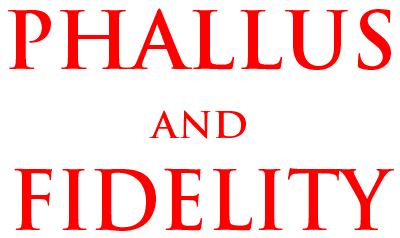
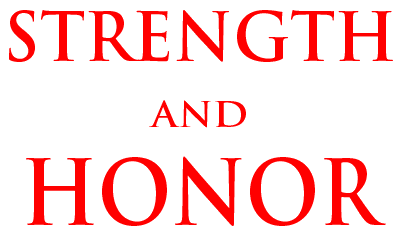
or you can have a culture based on anus and promiscuity, effeminacy and lies.
But you can't have both.
Just as you can have a culture based on Virtue; or one based on Greed.
But you can't have both.
It would be convenient for you if you could have both.
Because then you wouldn't have to make any inconvenient choices.
But life is not convenient.
If life were convenient, there would have been no economic crisis.
Housing prices would have kept rising, and derivatives delivering.
And everyone would have lived happily -- more or less -- ever after.
But that's not reality.
And, as Xenophon understood, wherever reality comes into contact with men, it educates them through suffering and hardship.
The trick is to learn the lessons which reality is trying to convey.
What are those lessons about?
Well, they're about Courage, and Justice, and Self-Control.
And, perhaps, the Love of Wisdom and the Love of God too.
But we can start with Courage and Justice.
For you, Courage means stating publically that you're a Man who Loves Men and Masculinity -- and that you express that Love through Frot.
While that doesn't require as much Courage as facing down a wild boar armed only with a spear -- as Xenophon and his friends did -- it still requires Courage.
Exercising that Courage -- and Courage is like anything else -- to keep it viable in your life, you need to exercise it --
Exercising that Courage, will make it possible for you to begin to have what you need to Live and Love as a Man.
Not exercising that Courage -- letting it continue to atrophy, as you've done -- will lead to more of the same -- more greed and entrapment in the market place.
As for Justice -- well, just for starters, Justice means donating to the Alliance -- and not leaving all that work to and leeching off of a handful of other people.
And it's the same deal -- not exercising Justice will lead to its continued atrophy in your life, and to more greed and entrapment -- your entrapment and entrapment by your own greed -- in the market place.
So:
You can have this:
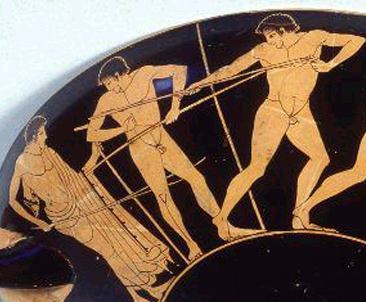
And this:
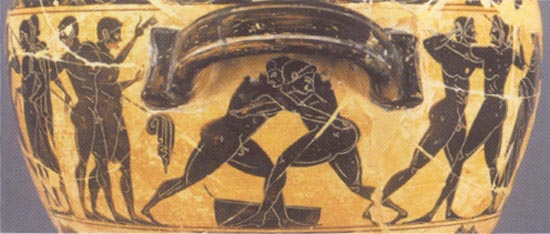
And this:

Or you can have this:

But you can't have both.
You can have Nude Men training, and fighting, and hunting together --
their dicks and balls swinging free in the breeze --
those dicks and balls being both symbol and metaphor for the Freedom of those Men to Love each other organically and naturally --
to Love each other as MEN --
or you can have expensive aggregations of polyurethane foam, nylon, and ersatz suede.
You can't have both.
You may think you can, but you can't.
Because the two are products of value systems which are diametrically opposed to each other.
Those Nude Men you see in such abundance in the ancient world, training and fighting and hunting and loving each other -- are the product of a value system based on VIRTUE:



Vir -- Virilis -- Virtus.
Man -- Manliness -- Virtue.
Ares -- Aristeia -- Areté.
Manhood -- Manly Valour -- Virtue.
That's what the lives of ancient Men were about.
That's what gave them the Freedom to be Men.
They were Valourous because they were Free -- they were Free because they were Valourous.
Do you understand?
You cannot have the Freedom to Love and Live as a Man -- until and when you demonstrate the Courage to Fight for that Freedom.
And if you won't fight you'll remain what you are -- a slave -- a slave to heterosexualization, to heterosexism, to analism --
and above all, to the Market and to Greed.
A slave to Greed.
That's how you'll have spent your life.
Every once in a while the system will throw you a bone -- in the form of a flat-screen TV or an SUV or an expensive pair of shoes.
And for a few moments, you'll be distracted, and you'll feel better.
For a few moments.
And then the terrible aching emptiness and loneliness which is at the heart of your life -- your so-called life, your meager existence -- will return.
In The Strife of Valour I quoted from a Harvard psychologist and happiness-expert named Daniel Gilbert, who said
the best predictor of human happiness is human relationships and the amount of time that people spend with family and friends.We know that it's significantly more important than money and somewhat more important than health. That's what the data shows. The interesting thing is that people will sacrifice social relationships to get other things that won't make them as happy -- money. That's what I mean when I say people should do "wise shopping" for happiness.
Dr Gilbert uses the language of the marketplace and says "people should do 'wise shopping' for happiness."
But what he means, as he makes clear, is that happiness lies OUTSIDE the marketplace -- in the webs of relationship that human beings create.
Dr Gilbert doesn't talk about male-male relationships -- that's not within his baliwick --
but that's what ancient Men had.
Webs of human relationships, most of them with other Men -- Men with whom they grew up, trained, wrestled, fought, ate -- and just generally hung out -- and whom they were FREE to LOVE.
That was particularly true at Sparta -- but it was true in other Greek city-states and elsewhere as well.
But just looking at Sparta, and to paraphrase classicist W G Forrest:
The Spartan did not work -- he trained, with the men of his mess; he fought, with the men of his mess; or he was idle, again for the most part, one would imagine, with the men of his mess.
Jaeger:
The Spartan state deliberately made Eros a factor, and an important factor, in its agogé.
Classicist Michael Grant:
Examined soon after birth, all Spartan infants, if weak or deformed, were thrown over a cliff and killed. Those [males] who survived, at the age of seven or eight, were removed from their families and drafted into a 'herd' [known as the herd of young bull calves], under the control of a senior Spartiate [full-fledged Spartan warrior]. And for the next two decades they worked their way through a brutalizing series of state-oriented training programmes. During the course of this period, at the age of about twenty, they became eligible for one of the [all-male] Spartan messes or dining clubs, each of which possessed about fifteen members. ...
12345678910
Spartan HoplitesWhen these young men joined the Assembly, at the age of thirty, they had become ruthless, taciturn and unquestioning. Their predominant ethos was homosexual...
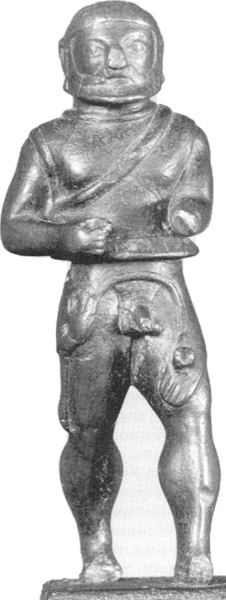
Grant says of the Spartans that "their predominant ethos was homosexual [sic]"
But that's misleading.
Yes, they spent most of their time with other Men.
And yes, they had love affairs with those Men, affairs of great intensity.
But they had wives -- and children too.
So, as we discuss in The Strife of Valour, there were webs of relationships at Sparta between and among Men, Women, and their Children.
The male-male relationships formed in the agogé, including the male-male love affairs, were obviously intense.
At the same time, the picture we get of Spartan marriages is that they were happy.
That's true, for example, in Plutarch's biography of the Spartan king Agesilaus, which includes a number of pleasant vignettes from his family life, while describing his intense and ardent interest in his male-male love affairs, starting with his relationship with the famous Spartan general Lysander when he -- that is, Agesilaus -- was still a youth taking part in the agogé.
Then there were the all the relationships between adult male Spartans -- Warriors -- and the boys and youths in the agogé, for whom they were expected to serve as both tutors and role models.
And there were all the relationships which adult Spartan women had with the girls -- relationships which were both sexual and non-sexual.
As with the Men, these relationships were supposed to be mentoring and educational.
So you have a society organized not around things or wealth, but around relationships which are founded on Virtue.
That's particularly true, of course, of the male-male romantic relationships.
And that cannot be overemphasized.
Jaeger, who's by far the greatest of the classicists we've quoted, says that the purpose of Eros was "by grave and ceaseless rivalry, by exertion involving the utmost energies of mind and body alike, to bring those qualities ["of physical prowess and spiritual harmony"] to the greatest possible perfection."
"Men who loved the possessors of those enviable qualities were moved by an ideal, the love for areté. Lovers who were bound by the male Eros were guarded by a deeper sense of honour from committing any base action, and were driven by a nobler impulse in attempting any honourable deed."
So -- the purpose of Eros is to drive out base action, and to enshrine the noble impulses of honorable deeds.
And once again, the goal is Virtue.
Achieved in no small part through male-male love affairs.
The Encyclopedia Britannica says those affairs were of "ferocious intensity."
"ferocious intensity"
The bonds uniting these Men were ultra-powerful.
And, adds Jaeger, "the erotic aspect of that power" ... "is easily overlooked in comparison with its passionate moral earnestness" -- but should not be.
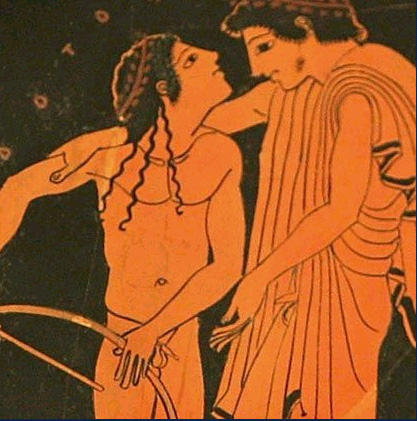
And guys, here's the deal.
The "passionate moral earnestness" of the Greek male's pursuit of and devotion to his male lover -- and to his and his lover's moral beauty -- is what creates the ferocious intensity of male-male Eros.
Which means, that you can't have one without the other.
You can't expect to have a love affair of "ferocious intensity" in an amoral or sybaritic environment.
Won't happen.
The ferocious intensity is a reflection of the high-mindedness which underpins and informs the relationship.
The ferocious intensity is an expression of the Strife, the Strife of Valour, of Virtue, of Manhood, which, says Jaeger, is the Striving "by grave and ceaseless rivalry, by exertion involving the utmost energies of mind and body alike, to bring those qualities of physical prowess and spiritual harmony to the greatest possible perfection."
That's what those guys were doing.
They were Men struggling together to bring their Manhood -- both physical and spiritual -- to Perfection.
That was their goal.
In a society which afforded them ample opportunity to do so.
For, says Plutarch of the Spartans, "Except when they went on campaign, all their time was taken up by choral dances, festivals, feasts, hunting expeditions, physical exercise and conversation."
How's your time taken up -- bro?
Again, the Spartans lived naturally and organically.
Possessions were frowned upon.
Virtue was celebrated.
Manhood exalted.
And, as a consequence, Natural Masculinity flourished.
Because the naturally masculine man spends most of his time with other men, with whom he's tightly bonded through eating together, training together, fighting together, hunting together, and just plain hanging out together.
Once again -- how do you spend most of your time?
You need to choose -- and you need to choose NOW -- what you want for the rest of your life:
Things? Shoes?
Or the company of Men -- naturally masculine Men.
And how will you experience male-male affection and intimacy?
As "homosexuality," an expression of sickness, consumerism, and greed?
Or as Eros --
A Strife of Valour, of Virtue, and of Manhood, a quest for both physical prowess and spiritual harmony, inspired by God, and dear to the Gods.
I thank Chris for his beautiful emails and his brave life.
He's a true Warrior.
He's looking for other true Warriors in his home-turf of nothern Alabama and Tennessee to form a Regional Chapter of The Man2Man Alliance.
Join him.
Bill Weintraub
February 27, 2009
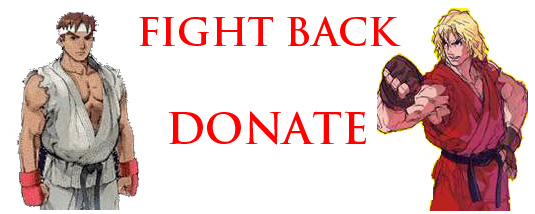
© All material Copyright 2009 by Bill Weintraub. All rights reserved.
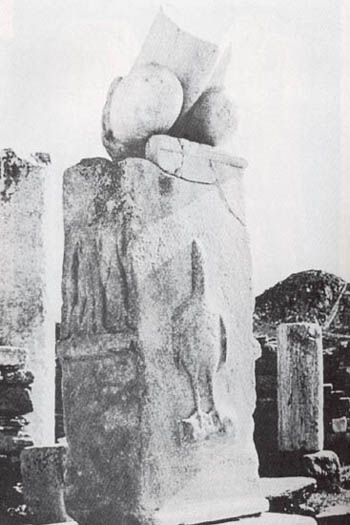
Re: Reclaiming Our Nobility as Men
3-10-2009
Welcome Chris,
By that I do mean Welcome to the Alliance and I'm glad you've found the Man in Eros that you deserve.
Every Man deserves to find that Man.
I hope that through the Alliance, we're able to help other Men find their special Man in Eros.
Because I need mine.
Love,
Brian
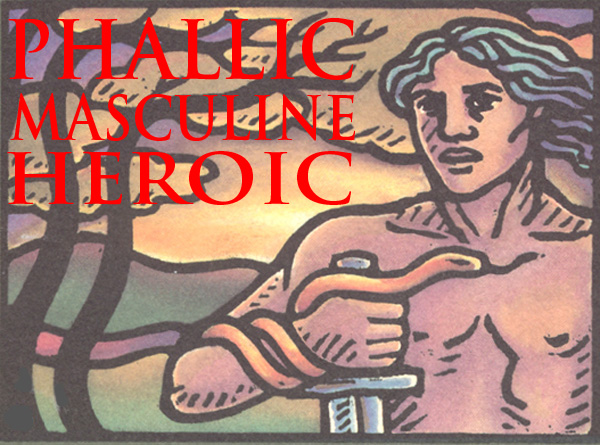



AND


Warriors Speak is presented by The Man2Man Alliance, an organization of men into Frot
To learn more about Frot, ck out What's Hot About Frot
Or visit our FAQs page.

| Heroes Site Guide | Toward a New Concept of M2M | What Sex Is |In Search of an Heroic Friend | Masculinity and Spirit |
| Jocks and Cocks | Gilgamesh | The Greeks | Hoplites! | The Warrior Bond | Nude Combat | Phallic, Masculine, Heroic | Reading |
| Heroic Homosex Home | Cockrub Warriors Home | Heroes Home | Story of Bill and Brett Home | Frot Club Home |
| Definitions | FAQs | Join Us | Contact Us | Tell Your Story |

© All material on this site Copyright 2001 - 2010 by Bill Weintraub. All rights reserved.
